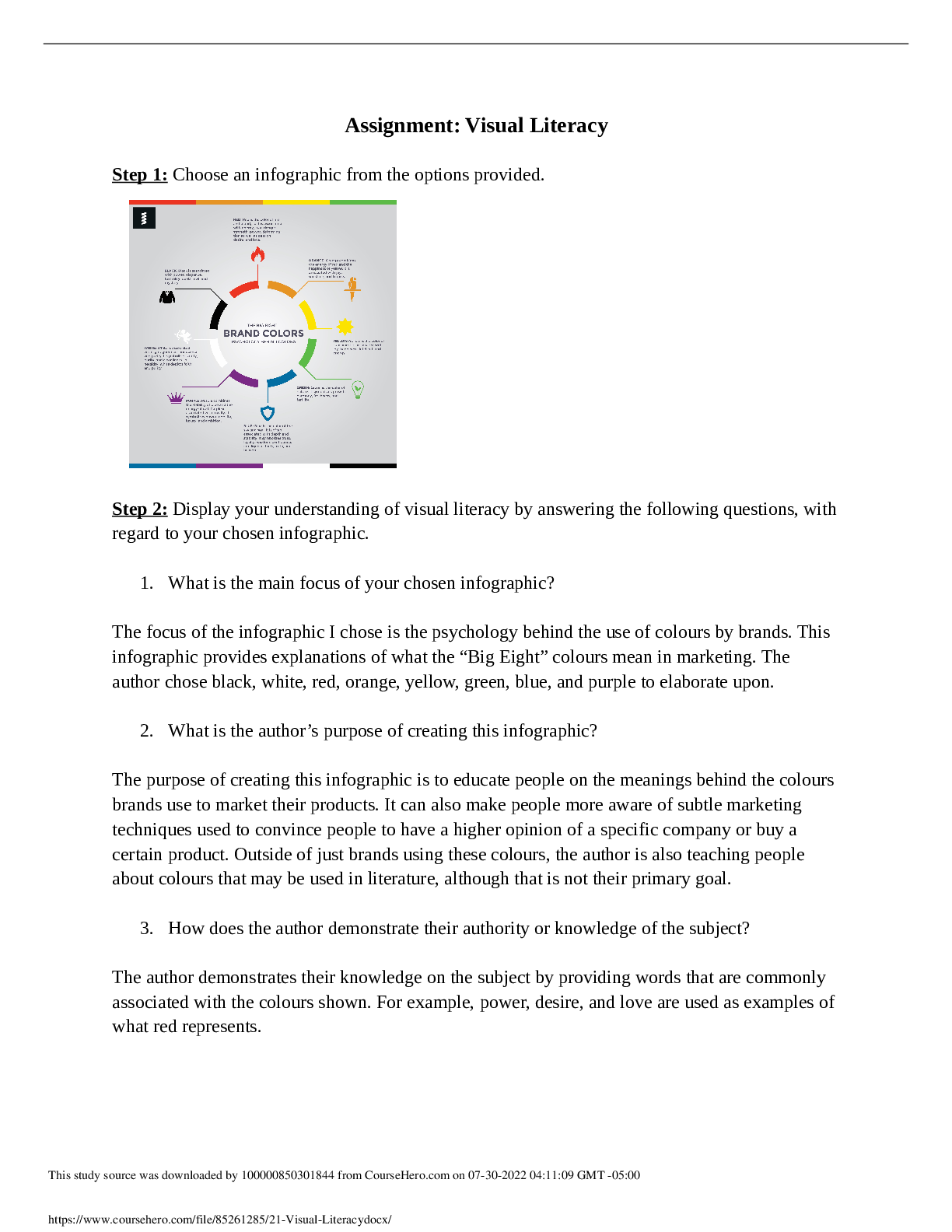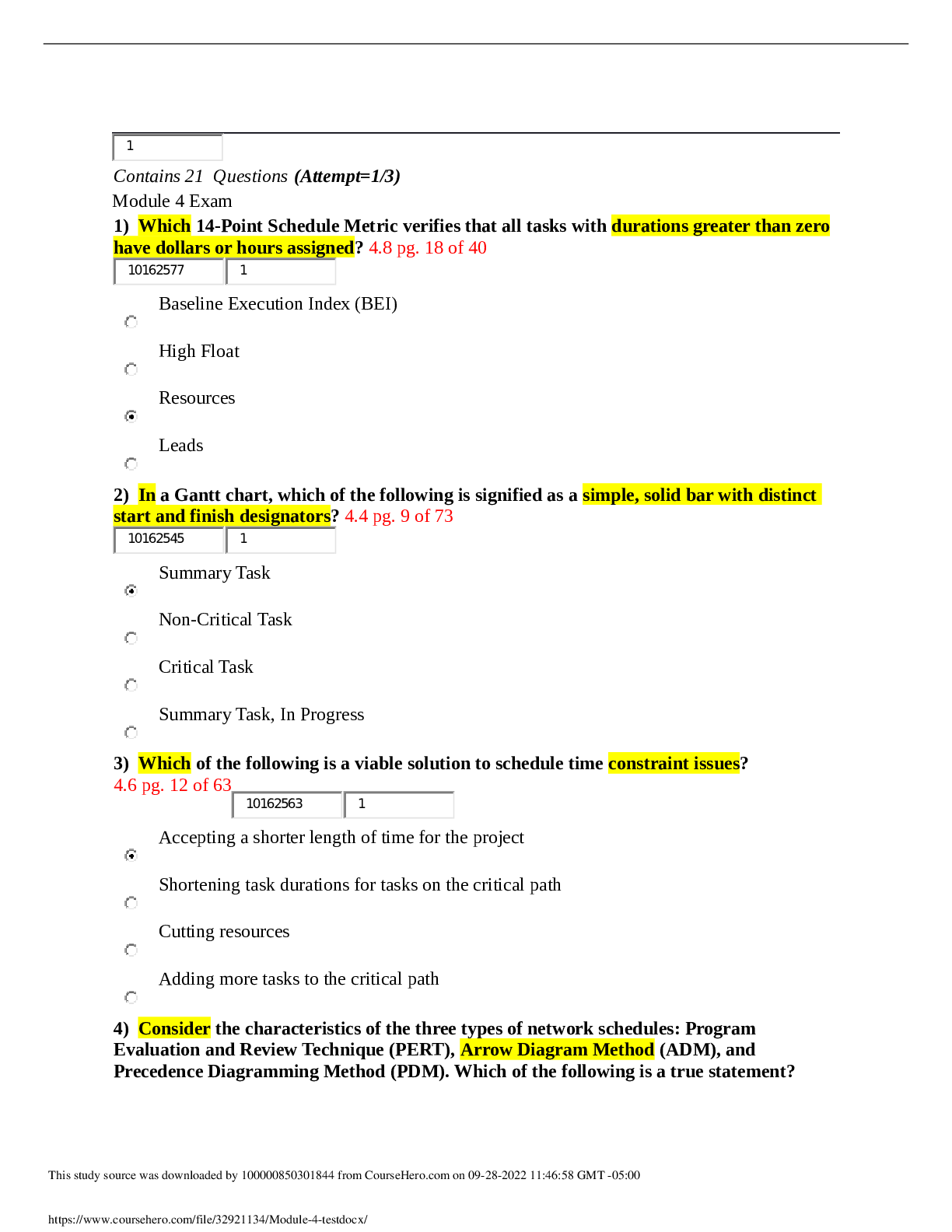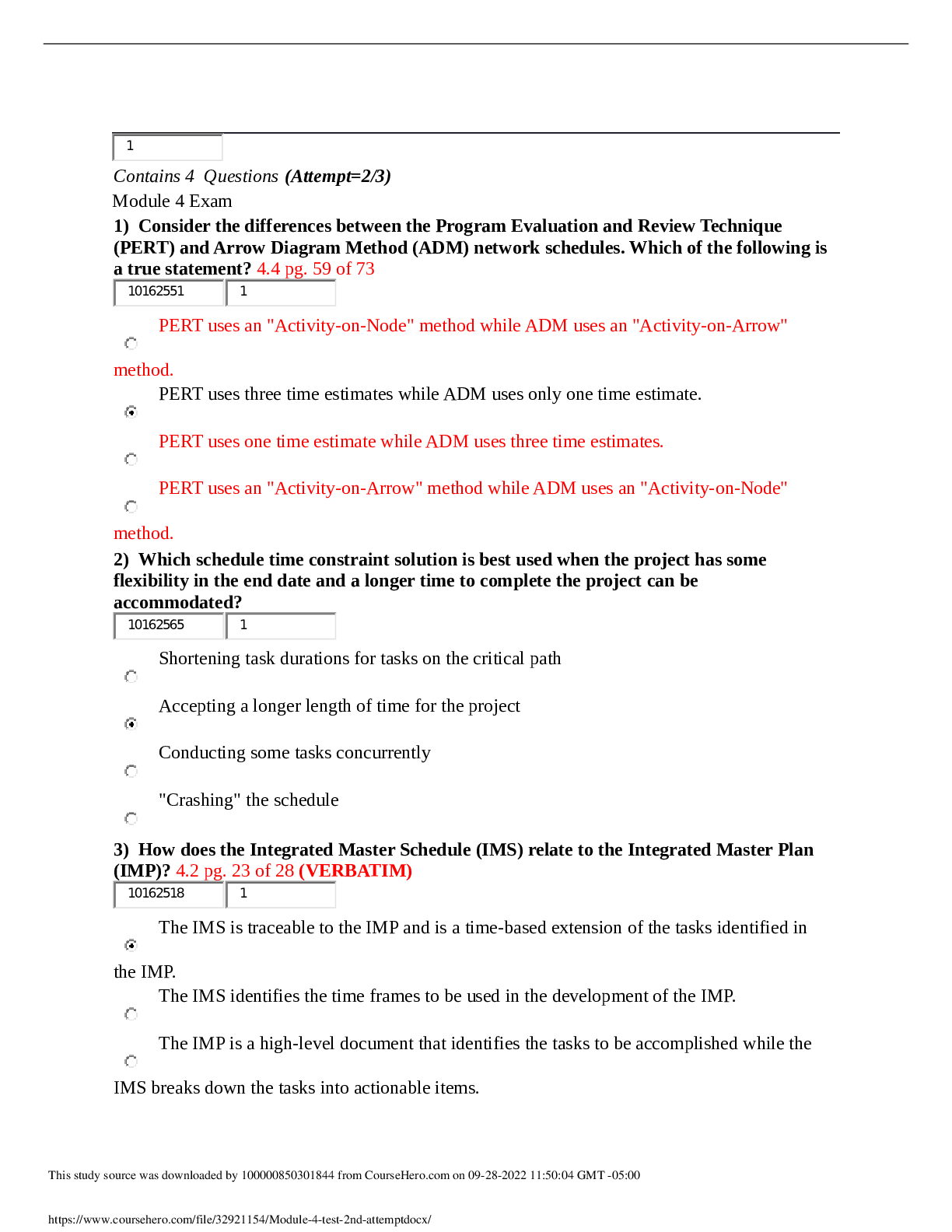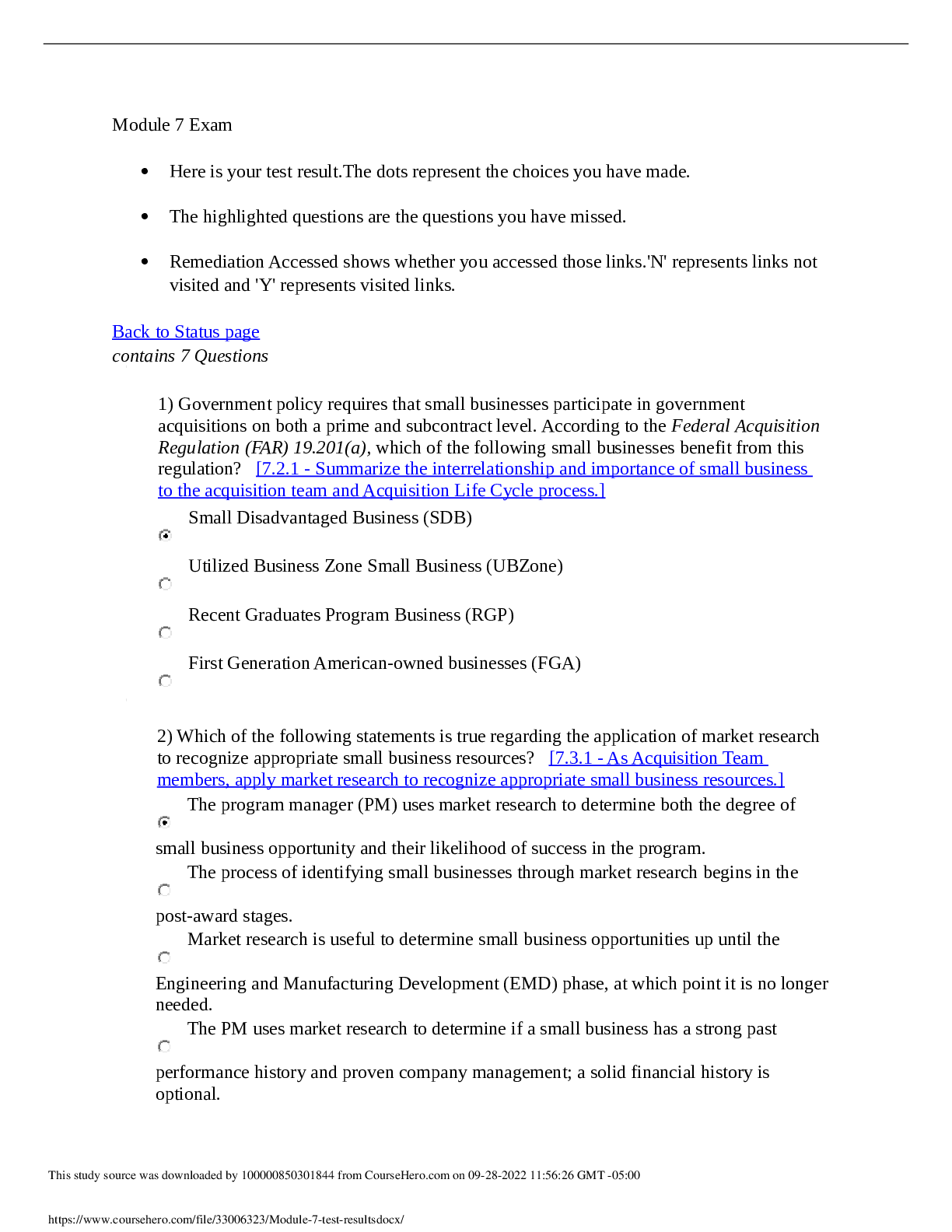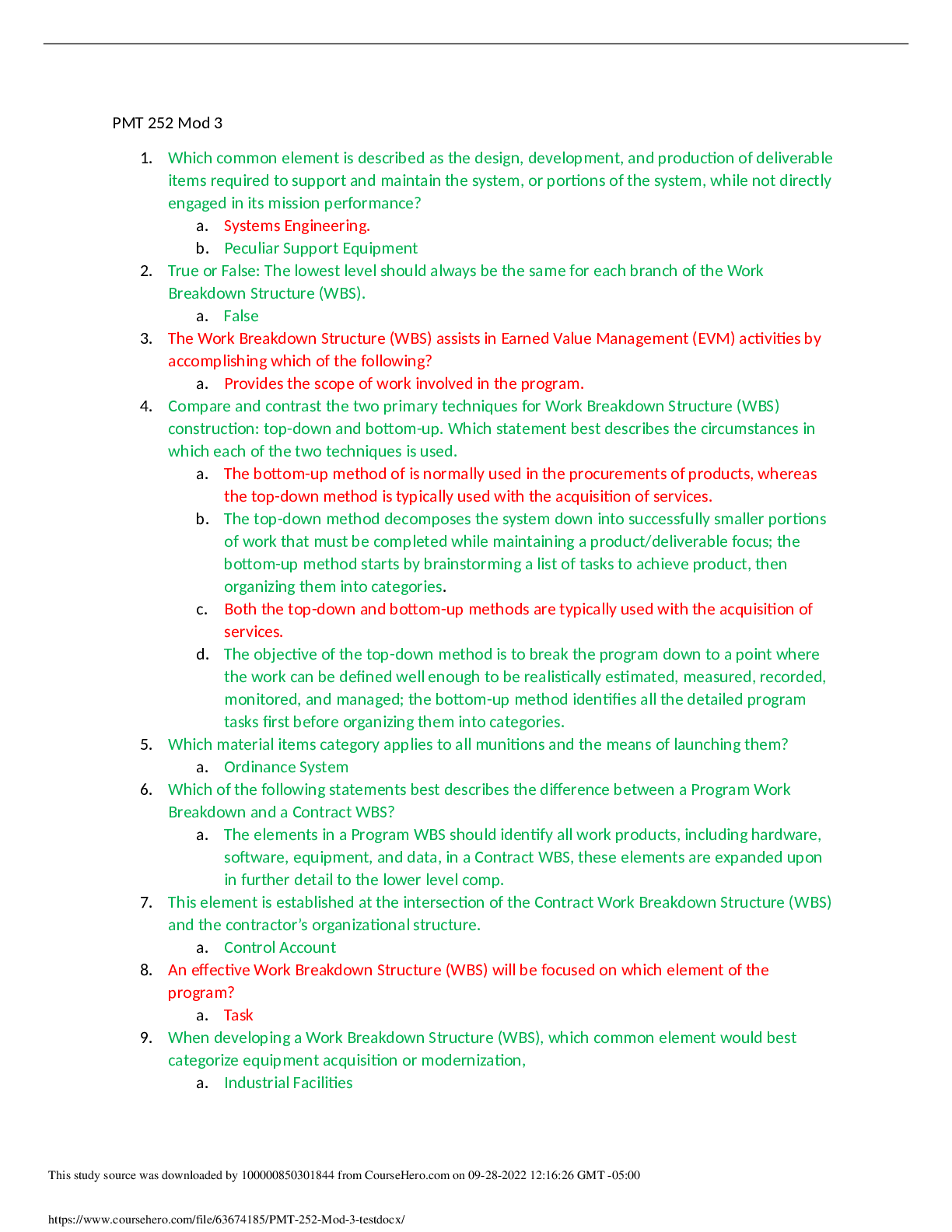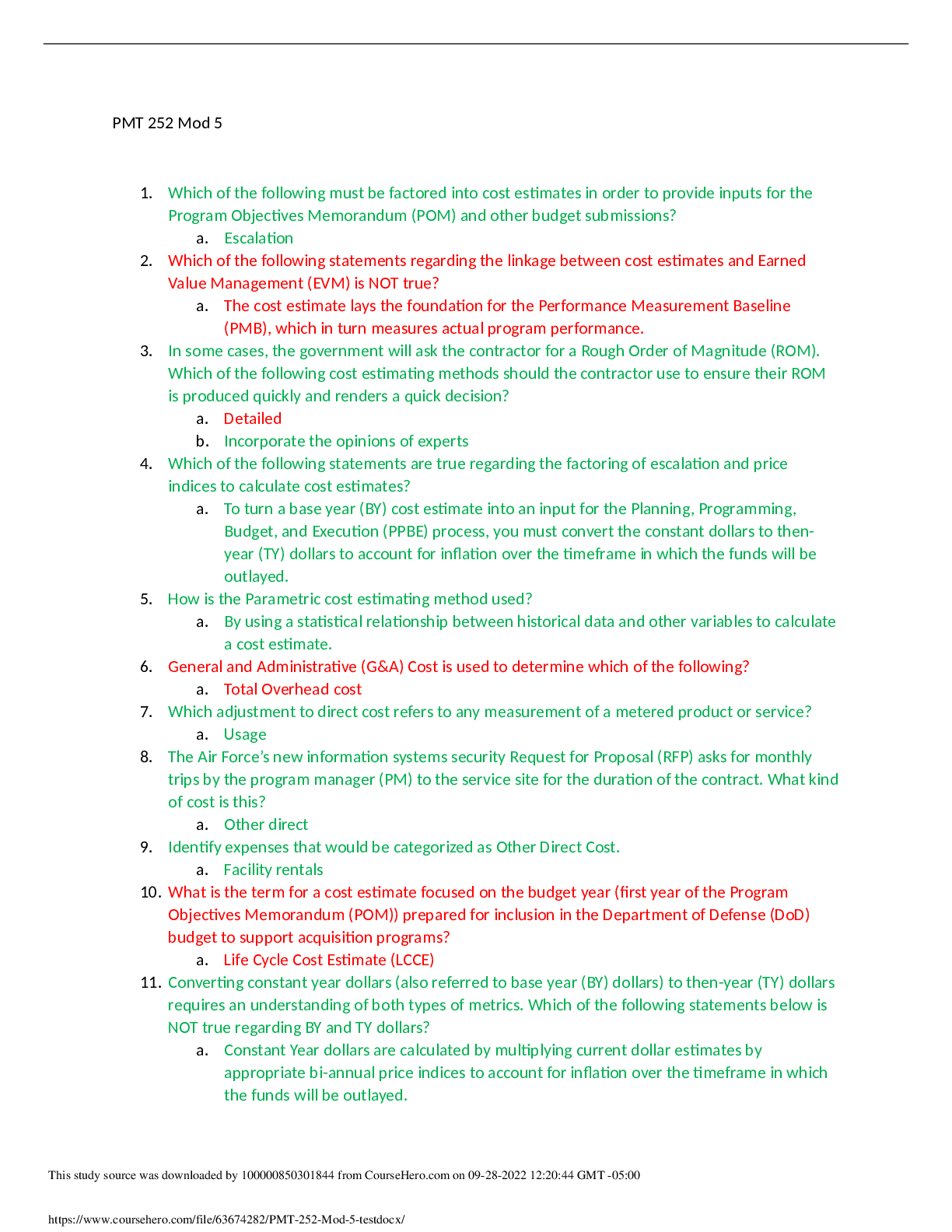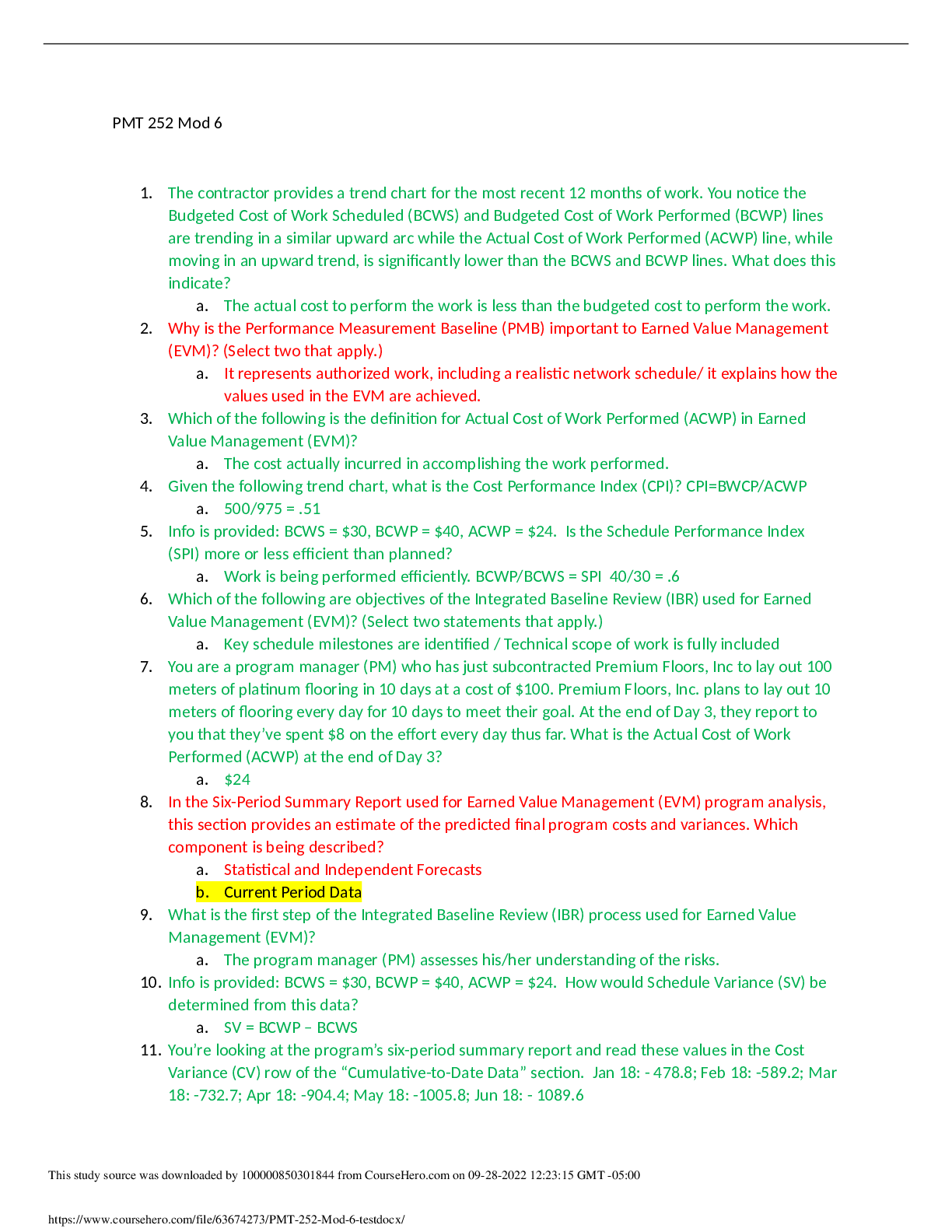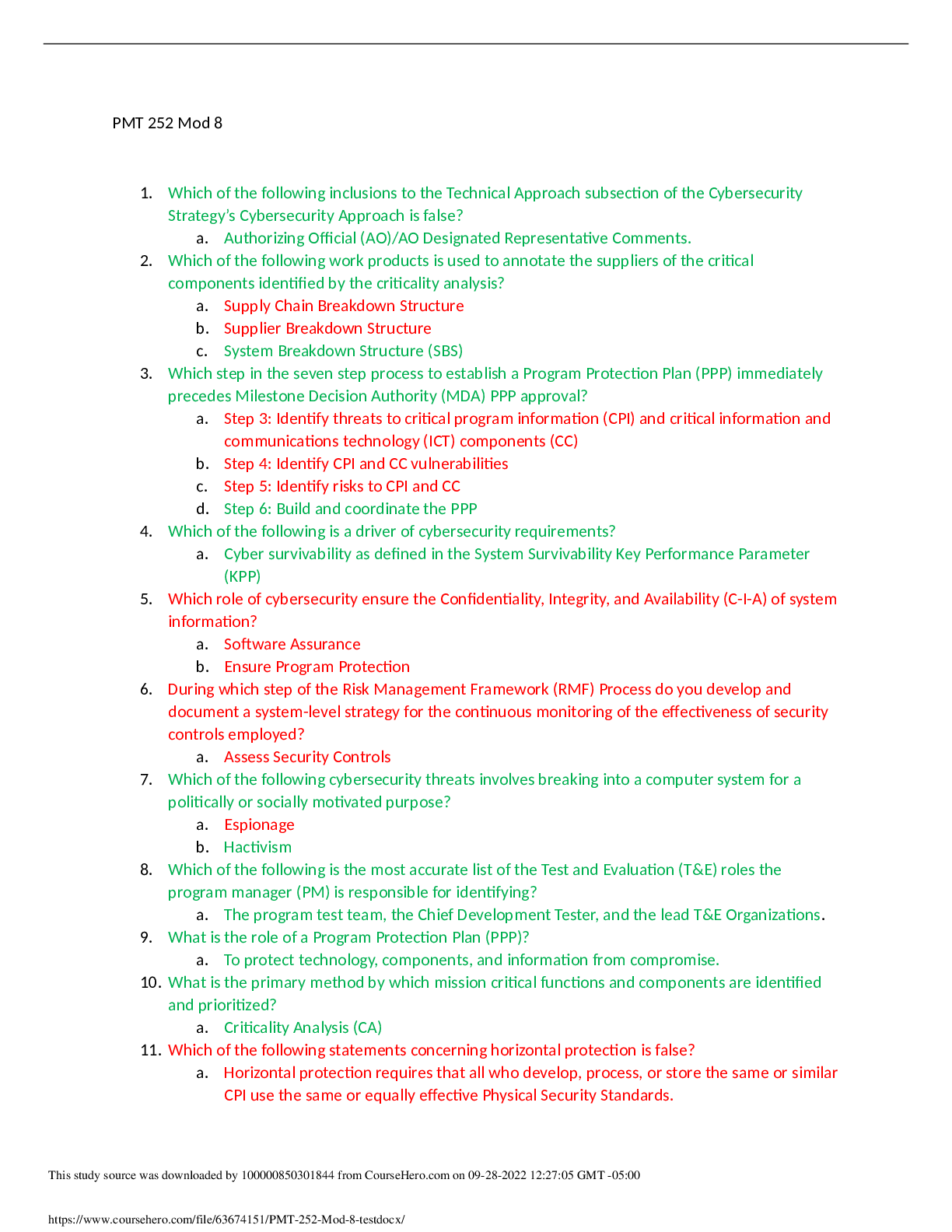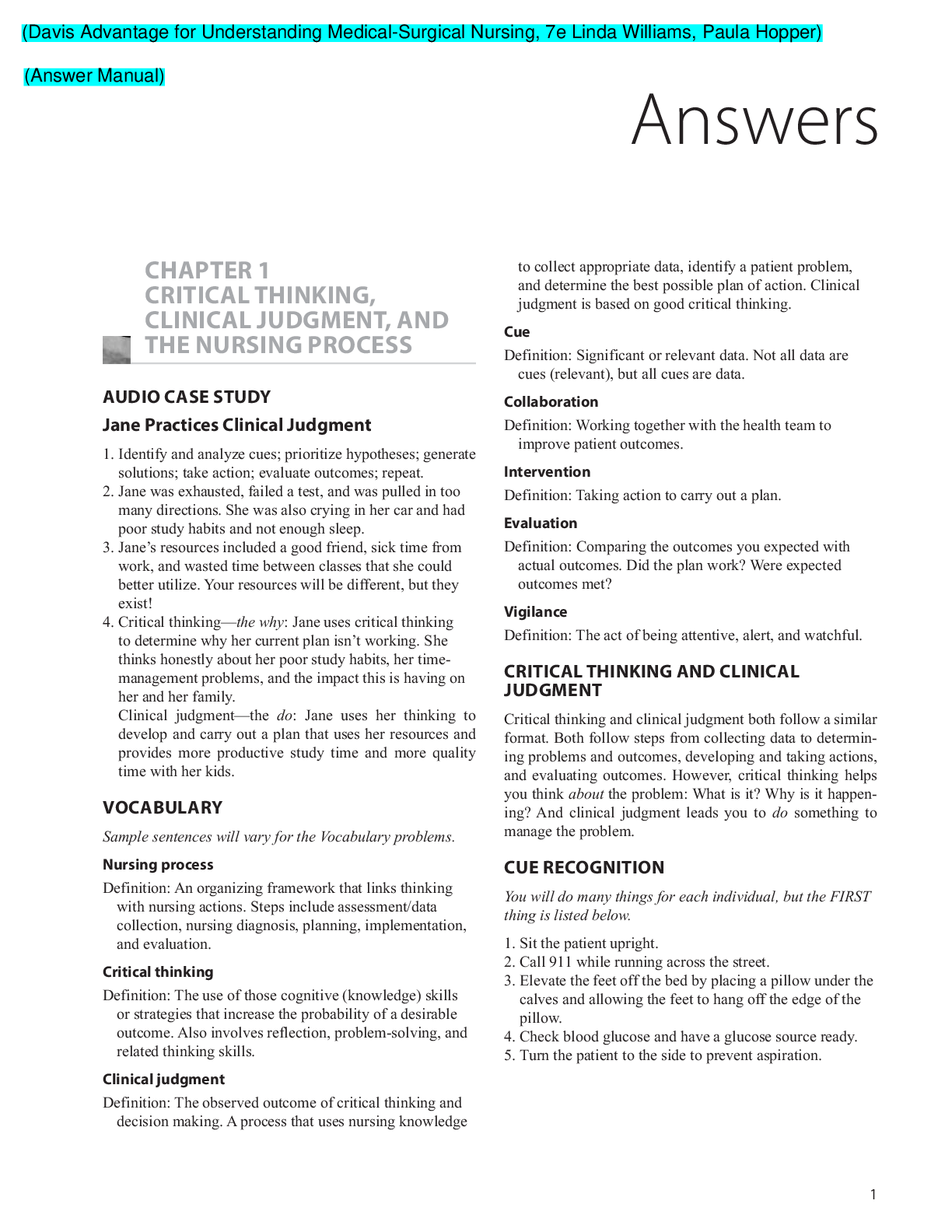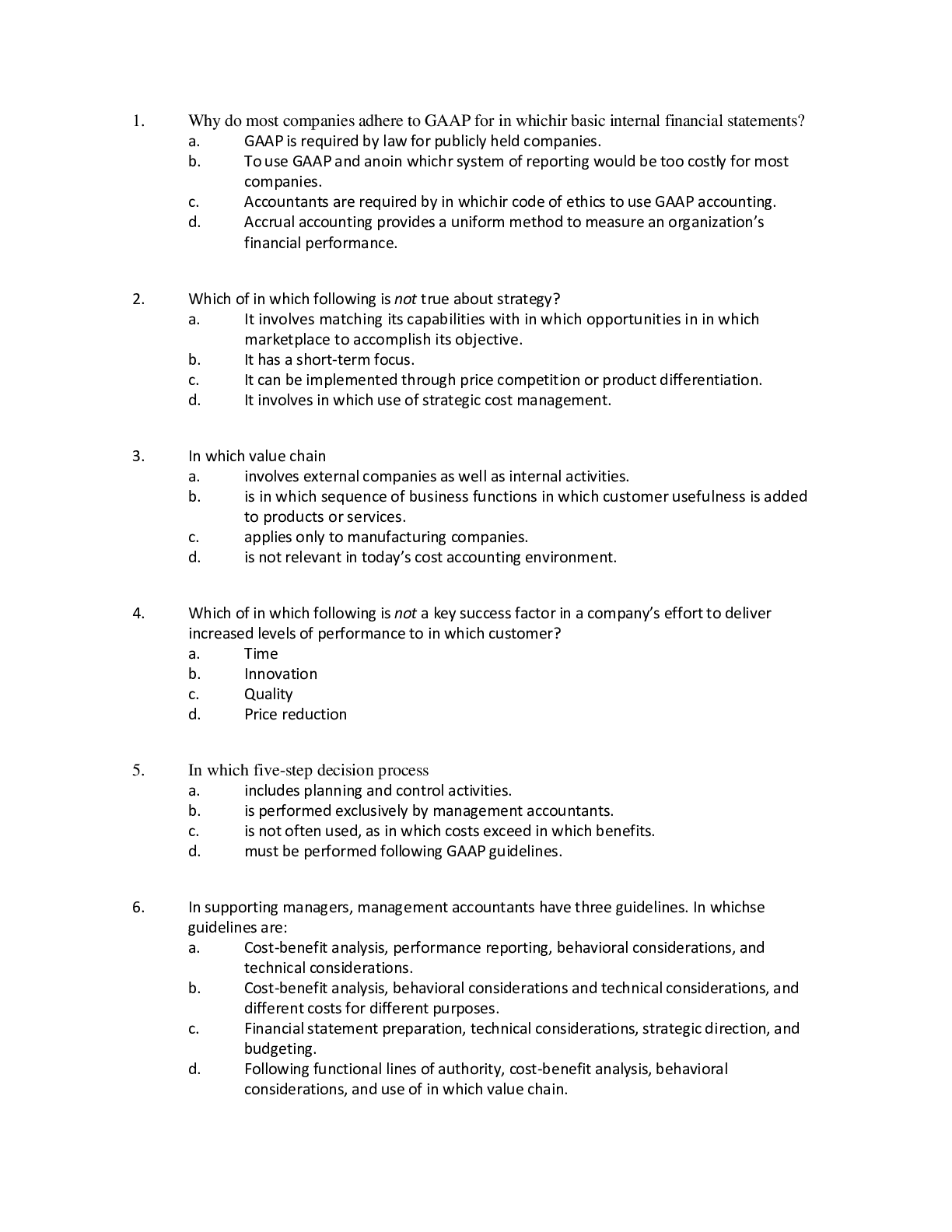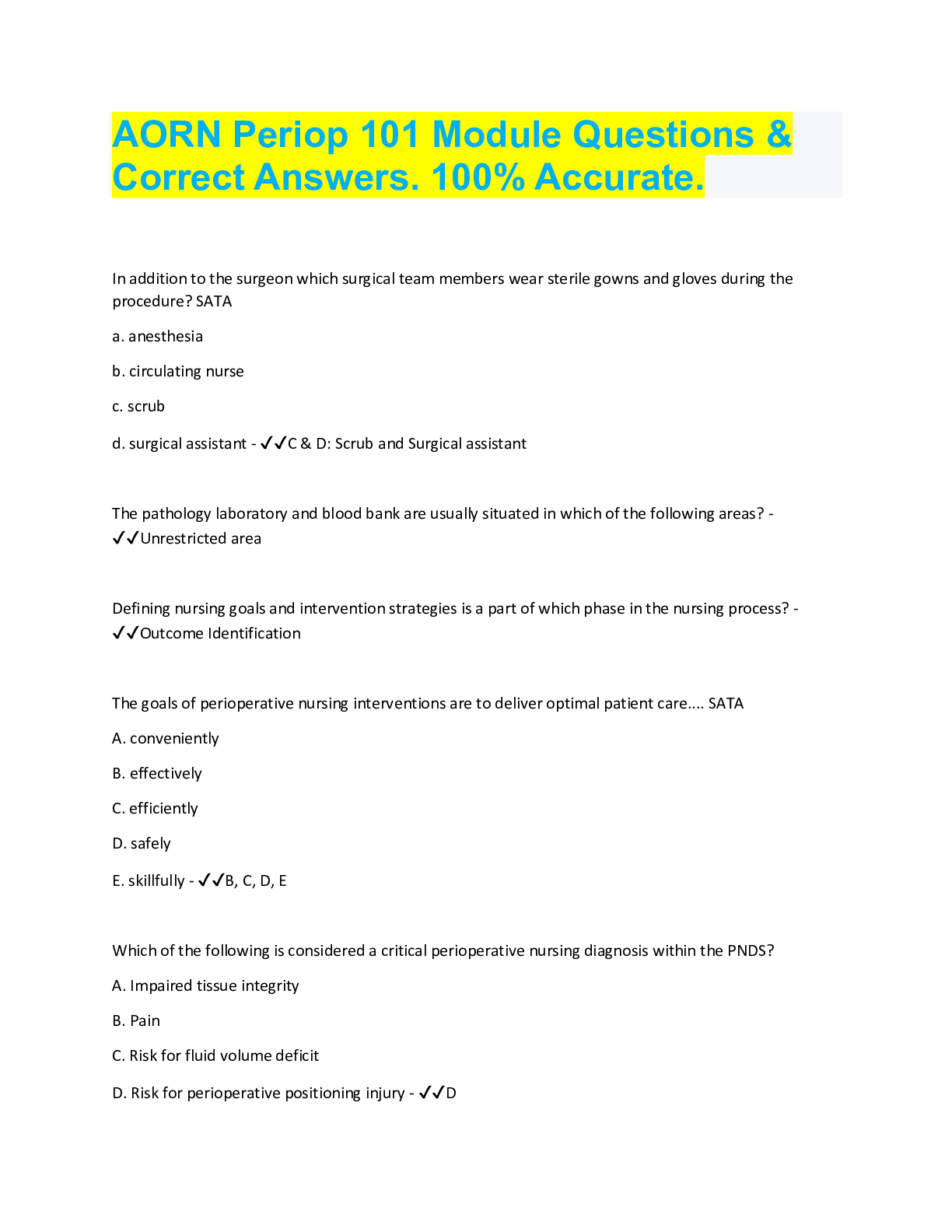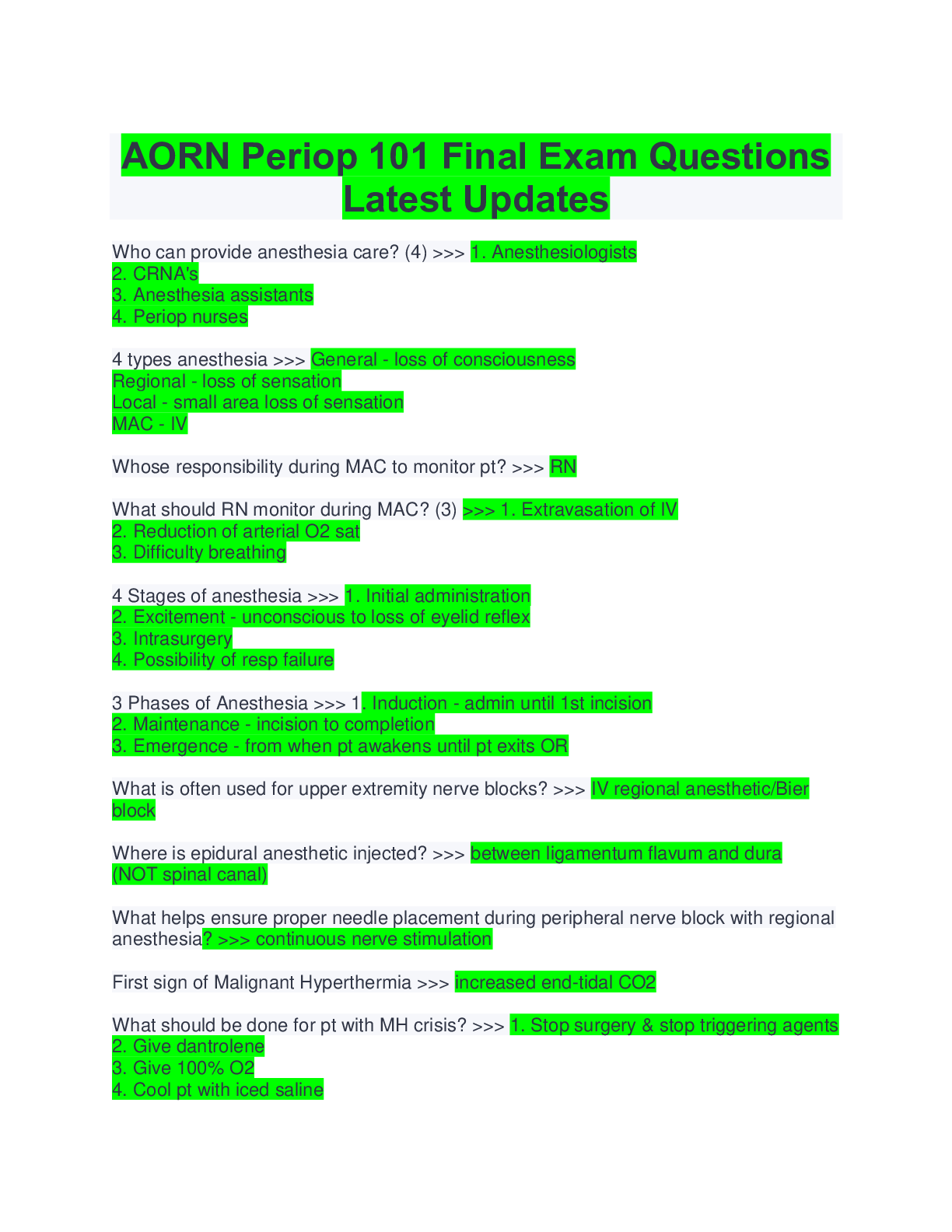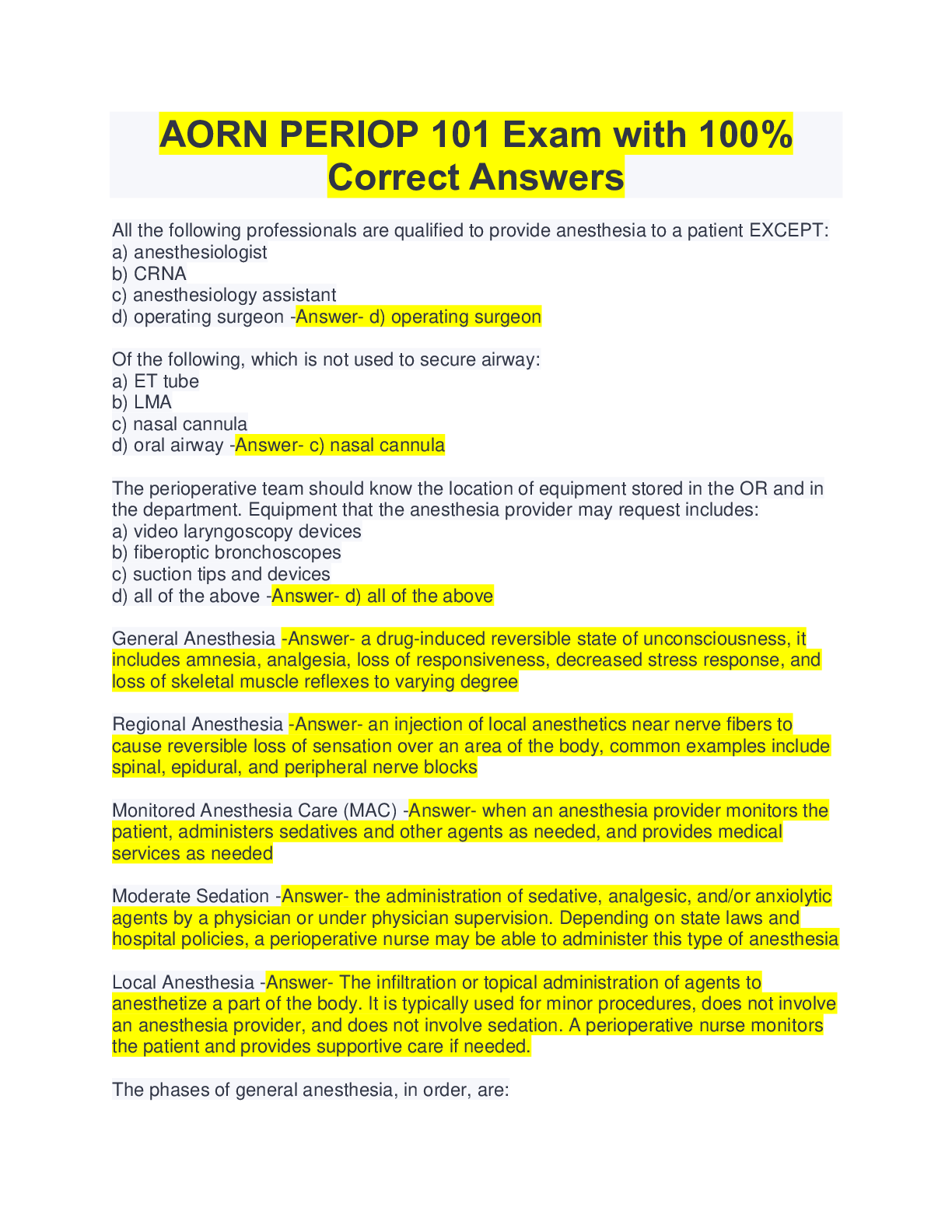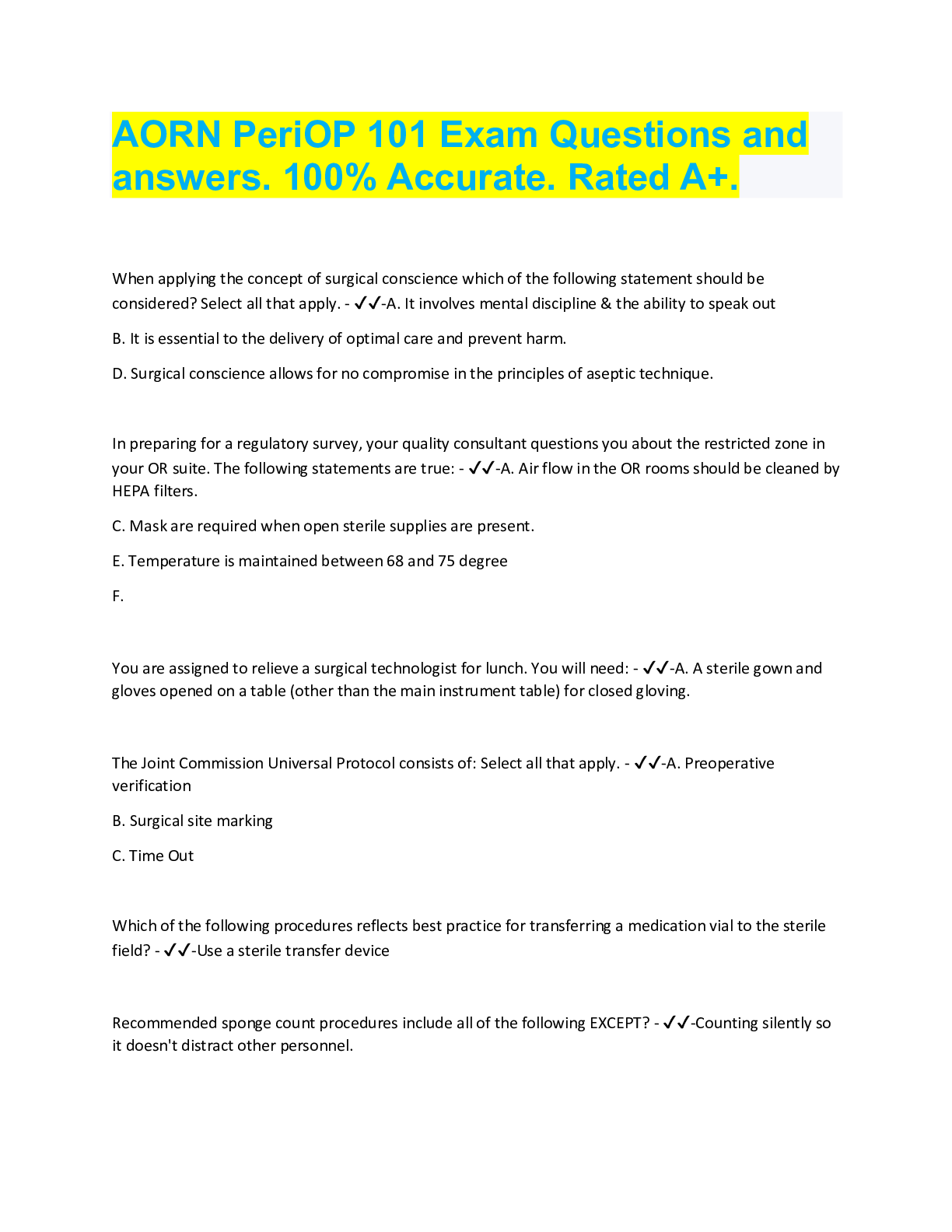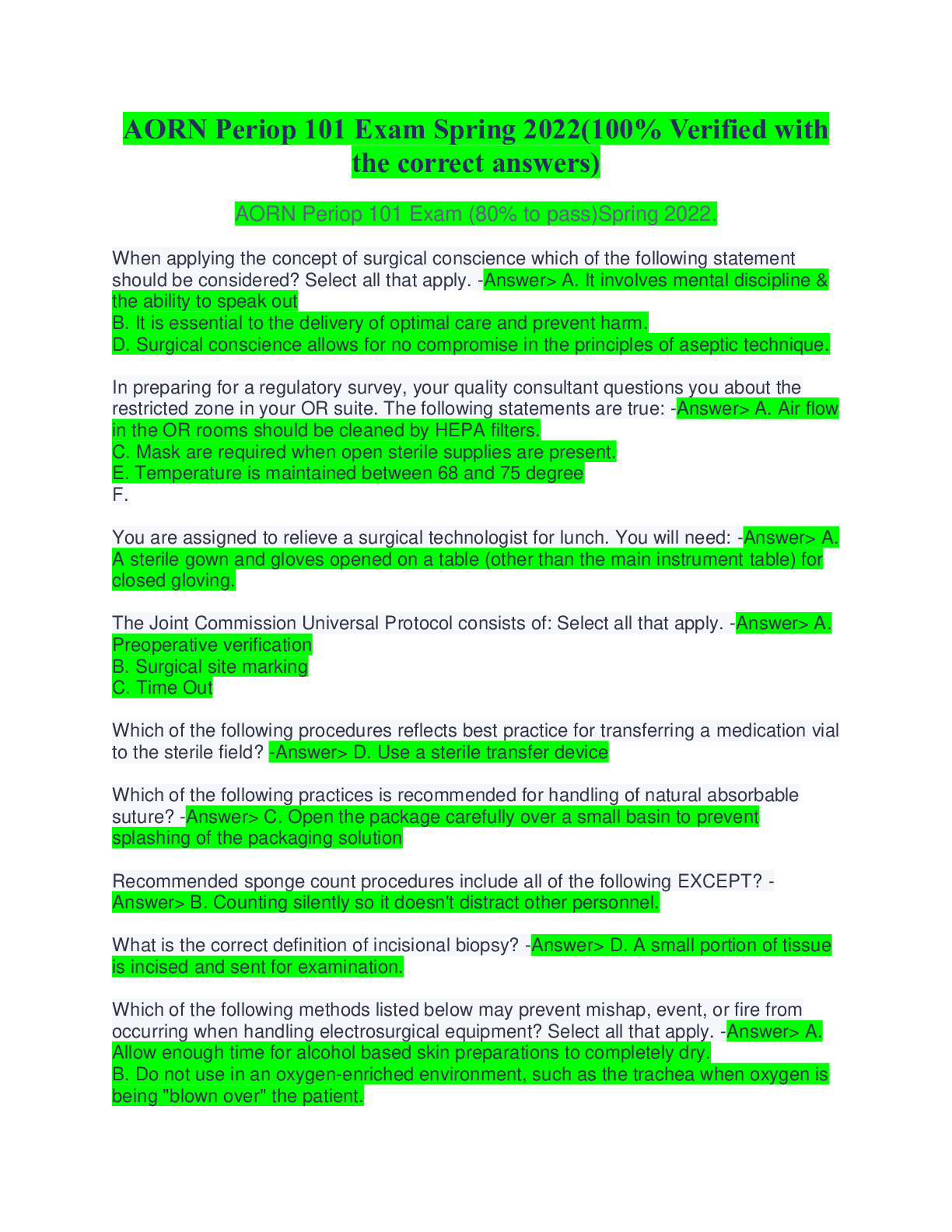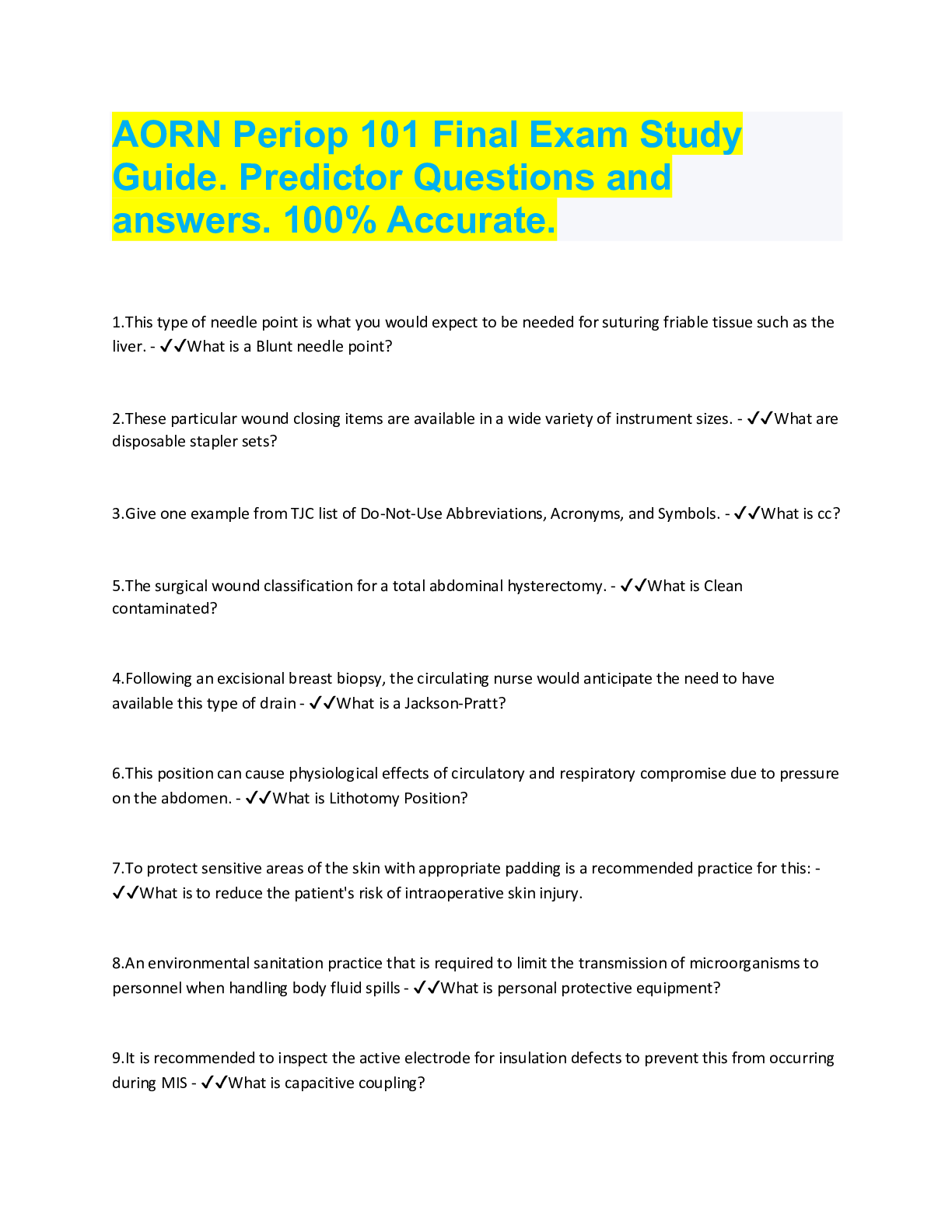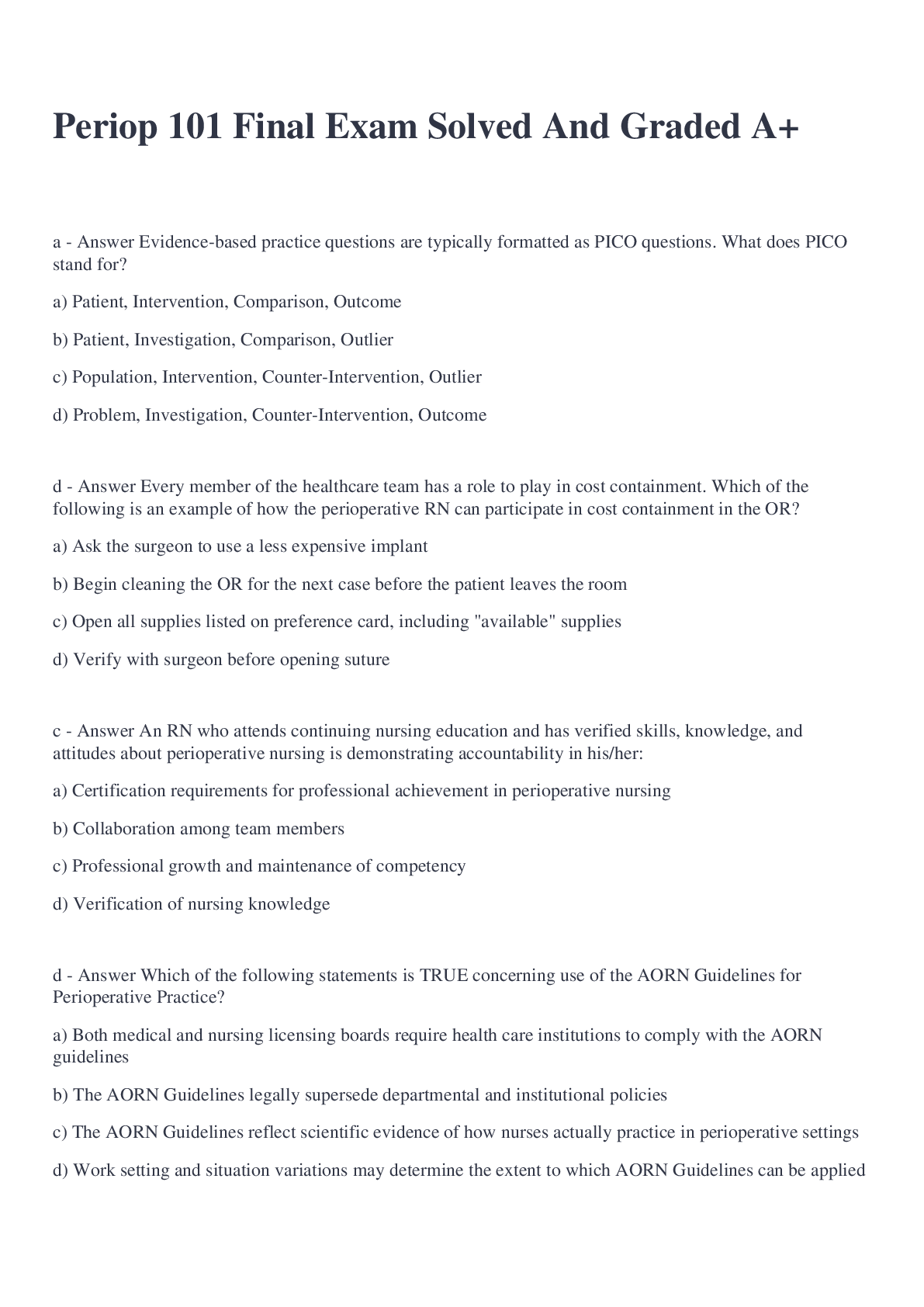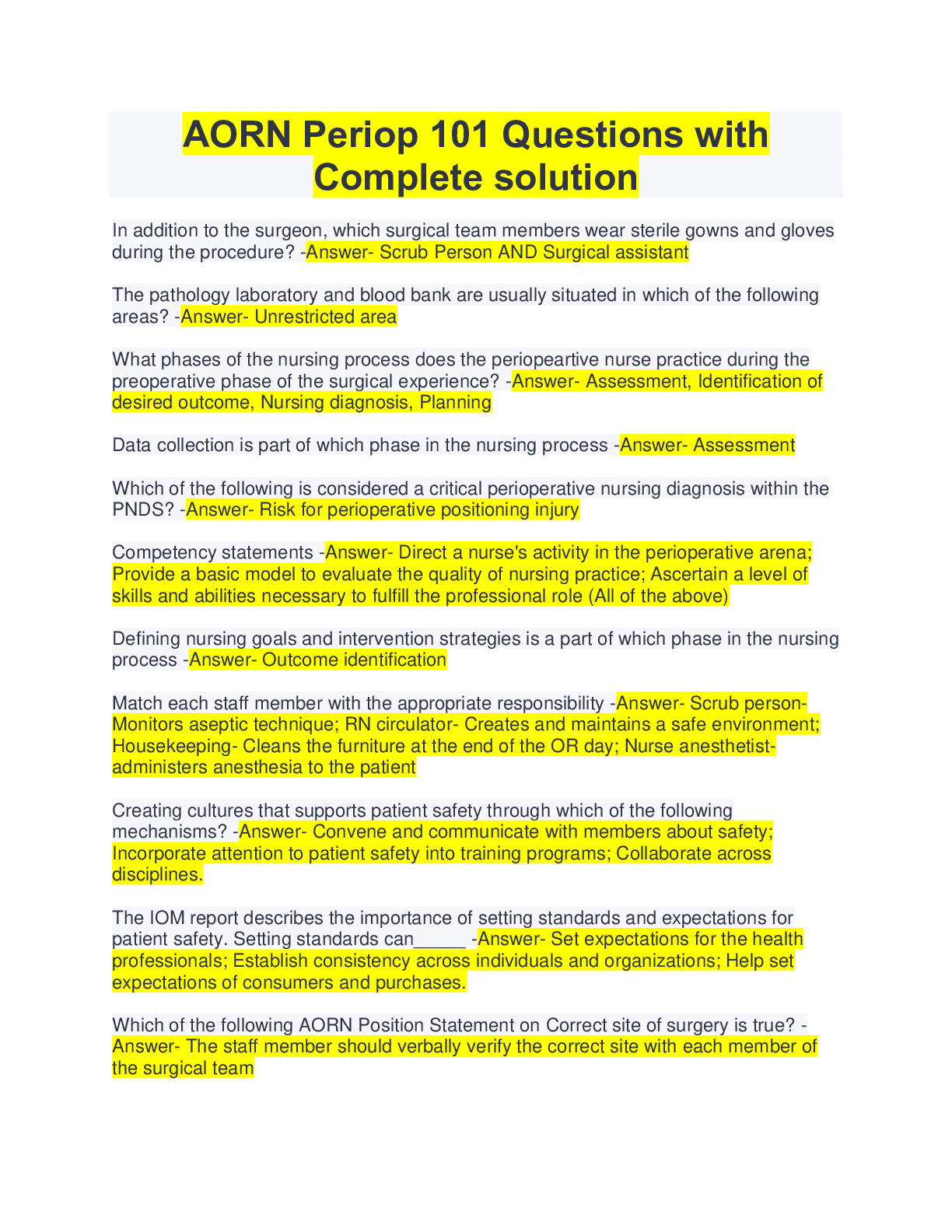Management > QUESTIONS & ANSWERS > Defense Acquisition University PMT 252 252 Module 4 test results (All)
Defense Acquisition University PMT 252 252 Module 4 test results
Document Content and Description Below
Back to Status page contains 21 Questions 1) The detailed tasks required to be completed and identified in the time-based Integrated Master Schedule (IMS) are directly linked to what element of the... event-based Integrated Master Plan (IMP)? [4.2.1 - Relate the relationship of the Integrated Master Plan (IMP) to the Integrated Master Schedule (IMS).] [Remediation Accessed :N] Criteria Accomplishment Event Assignment 2) In which step of the Schedule Development and Management Process do you identify the quantity and types of labor categories required to complete a task? [4.3.1 - Select the six steps for the schedule development and management process.] Determine Resource Requirements Identify Tasks Estimate Task Duration Monitor and Control Program Schedule 3) Which task dependency is the most common type of schedule relationship and involves a successor not being able to start until the predecessor finishes? [4.3.2 - Given a task relationship scenario, identify the standard type of dependencies or relationships between schedule activities.] Finish-to-Start (FS) Finish-to-Finish (FF) Start-to-Start (SS) Start-to-Finish (SF) 4) After starting the Schedule Development and Management Process by identifying a comprehensive list of program tasks, assigning identifiers, and including additional information such as potential constraints, what sort of product should the program manager (PM) expect to have? [4.3.3 - Identify the end result of the identification of schedule tasks step.] A visual representation of the task list showing the breakdown of work packages into tasks and the listing of all tasks in a task list A visual representation of the task list showing the sequencing of each task and the listing of all tasks in a work package A visual representation of the task list showing all resources needed for each task and the listing of all tasks in a control account A visual representation of the task list showing all available float for each task and the listing of all tasks in a task list 5) Which schedule duration estimating method uses statistical relationships determined from historical data to calculate the estimate for certain tasks? [4.3.4 - Using a task duration estimating calculation, select the correct estimating technique.] Parametric Estimate Analogous Estimate Three-Point Estimate Single-Point Estimate 6) The summary schedule is generally associated with levels 1-3 of the Work Breakdown Structure (WBS), whereas the intermediate schedule is generally associated with which WBS levels? [4.3.5 - Identify the differences in schedules produced, as an output of constructing program schedules.] Levels 3-5 Levels 2-3 Levels 2-5 Levels 3-4 7) How are schedules in a schedule change management system similar to project elements under configuration management (CM)? [4.3.6 - Identify the key factors of a schedule change management system, as part of monitoring and control of program schedules.] In both a schedule change management system and CM, each version needs to be managed, controlled, and constantly monitored. In both a schedule change management system and CM, the first version is used consistently throughout the entire project. In both a schedule change management system and CM, versions are monitored only by the program manager (PM). In both a schedule change management system and CM, changes to versions can be made without notifying team members. 8) When is Agile Project Management typically used during the scheduling process? [4.3.7 - Explain the effects of agile project management on scheduling.] When requirements are likely to change as the project progresses When the schedule is stable and low-risk When requirements are likely to be fixed throughout the entire project When the schedule requires only one sprint 9) Which schedule type is also referred to as a bar chart since it depicts a task as a horizontal bar imposed over a time line or calendar? [4.4.1 - Identify the types of schedules commonly used in program management.] Gantt chart Network diagram Milestone chart Internal schedule 10) In a Gantt chart, which of the following is signified as a simple, solid bar with distinct start and finish designators? [4.4.2 - Using symbology on a Gantt chart, interpret the different types of relationships.] Summary Task Summary Task, In Progress Critical Task Non-Critical Task 11) Which of the following are advantages of network diagrams? (Select three that apply.) [4.4.3 - Identify the advantages/disadvantages of network diagrams.] Enables early detection of resource constraints Graphically depicts the relationship between project activities/events and their impacts Allows planners to do quick "what if" analyses of changes to the schedule Generally useful for information briefings and reviews 12) Consider the characteristics of the three types of network schedules: Program Evaluation and Review Technique (PERT), Arrow Diagram Method (ADM), and Precedence Diagramming Method (PDM). Which of the following is a true statement? [4.4.4 - Contrast the three network schedule types.] [Remediation Accessed :N] 4.4 pg. 54 of 73 PDM was developed to overcome the disadvantages of PERT and ADM, and doesn't treat all task relationships as "Finish-to-Start (FS)." PDM and ADM are seldom used due to the increase of computer-based scheduling tools. All three types of network schedules rely on time estimates for each activity to build an accurate schedule. PERT and PDM use the FS task relationship while ADM can use any type of task relationship. 13) Which of the following components of the Precedence Diagramming Method (PDM) is identified by expanding the schedule to display the Start and Finish columns? [4.5.1 - Using a simple PDM schedule format, identify the earliest and latest start and finish dates, critical path, and float (or slack).] Earliest and Latest Start and Finish Dates Critical Path Float/Slack Task identifiers 14) Which of the following are characteristics of the forward pass, one of the components of the Critical Path Method (CPM)? (Select three that apply.) [4.5.2 - Identify the components of the Critical Path Method (CPM).] Results in the earliest start dates for all the tasks Results in the latest finish dates for all the tasks Continues to the last task in accordance with task relationships Begins with the first task in the schedule 15) Consider the differences between a resource-constrained schedule and a timeconstrained schedule. Which constraint occurs when there is a shortage of people, equipment, facilities, or materials; and which constraint occurs when the length of the critical path surpasses the allotted time for the project? [4.6.1 - Identify the differences between a resource-constrained schedule and a time-constrained schedule.] Resource constraint, time constraint Time constraint, resource constraint Management constraint, time constraint Resource constraint, schedule constraint 16) Which of the following is a viable solution to schedule time constraint issues? [4.6.2 - Identify four solutions to time constraint issues.] [Remediation Accessed :N] 4.6 pg. 12 of 63 Shortening task durations for tasks on the critical path Accepting a shorter length of time for the project Cutting resources Adding more tasks to the critical path 17) Which schedule resource constraint solution is best used when there is a program benefit to using resources other than those originally planned? [4.6.3 - Identify four possible methods for working with resource constraints.] Substituting resources Adding resources Reducing program scope Adjusting the schedule to accommodate slack 18) A proposal manager asks the team to provide "80%" estimates for their schedule. The team believes that they have an 80% chance of finishing on time, when in reality, they do not. In this example, the team clearly does not take into account the overall uncertainty of the program. Which of the following causes for schedule risks and delays is being described? [4.7.1 - Identify the potential causes for schedule risks and delays.] Uncertainty in task duration estimates Unrealistic milestones or deadlines Incorrect schedule relationships or logic Inability to change the number of tasks 19) Prior to using the 14-Point Schedule Metrics, the number of each type of the four relationships (Finish-to-Start [FS], Finish-to-Finish [FF], Start-to-Start [SS], and Start-toFinish [SF]) for incomplete tasks needs to be calculated. This describes which of the following data types? [4.8.1 - Choose the type of data that needs to be calculated in preparation for using 14-Point Schedule Metrics.] Relationship Count Baseline Count Complete Tasks Incomplete Tasks 20) Which 14-Point Schedule Metric verifies that all tasks with durations greater than zero have dollars or hours assigned? [4.8.2 - Identify some of the 14-Point Schedule Metrics.] Resources High Float Leads Baseline Execution Index (BEI) 21) What are the first three steps in the process for building a Precedence Diagramming Method (PDM) schedule? [4.9.1 - Construct a simple network schedule using the PDM format.] [Remediation Accessed :N] 4.5 Identify the tasks, sequence the tasks, determine resource requirements Estimate task durations, determine resource requirements, sequence the tasks Sequence the tasks, identify the tasks, estimate task durations Determine resource requirements, estimate task durations, identify the tasks [Show More]
Last updated: 1 year ago
Preview 1 out of 8 pages
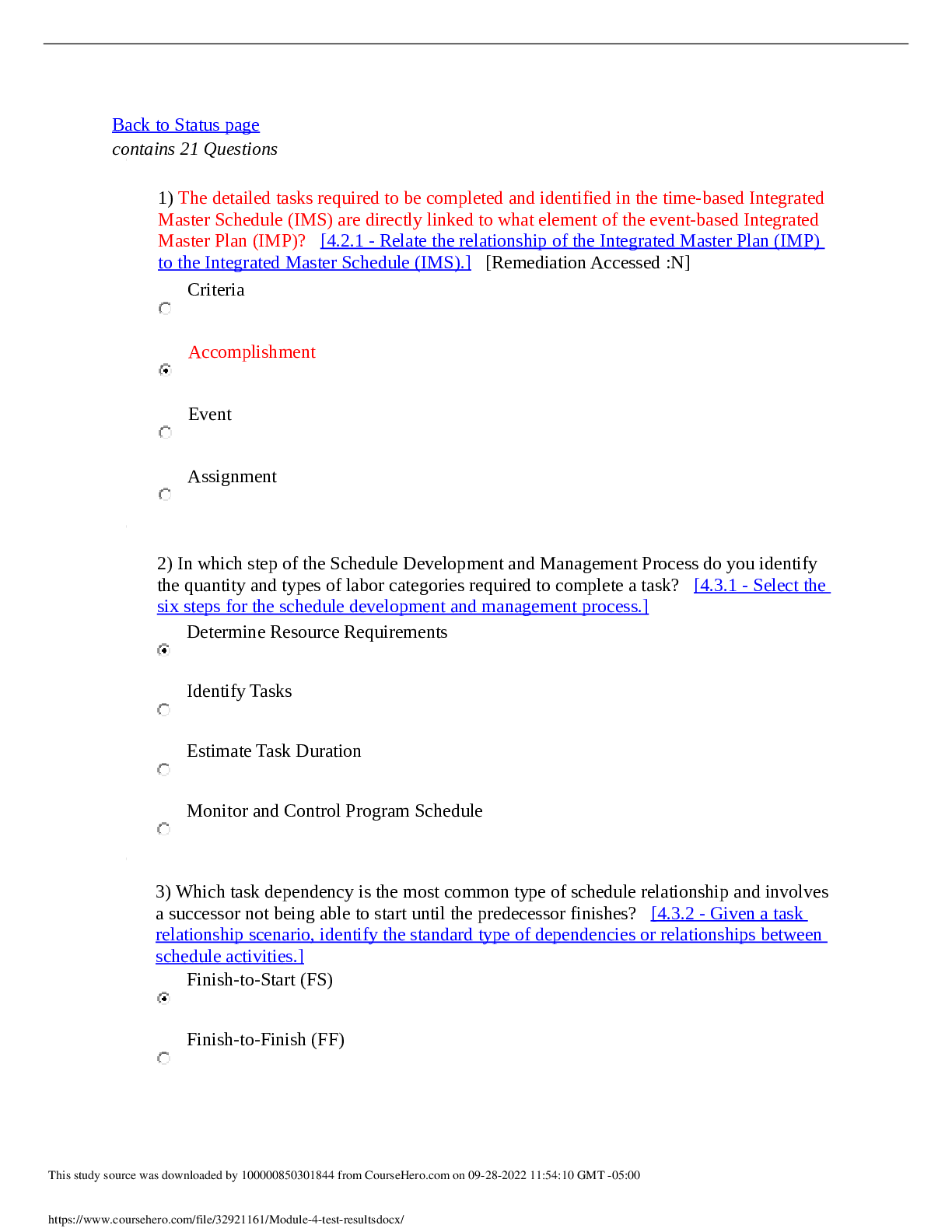
Reviews( 0 )
Document information
Connected school, study & course
About the document
Uploaded On
Sep 28, 2022
Number of pages
8
Written in
Additional information
This document has been written for:
Uploaded
Sep 28, 2022
Downloads
0
Views
48
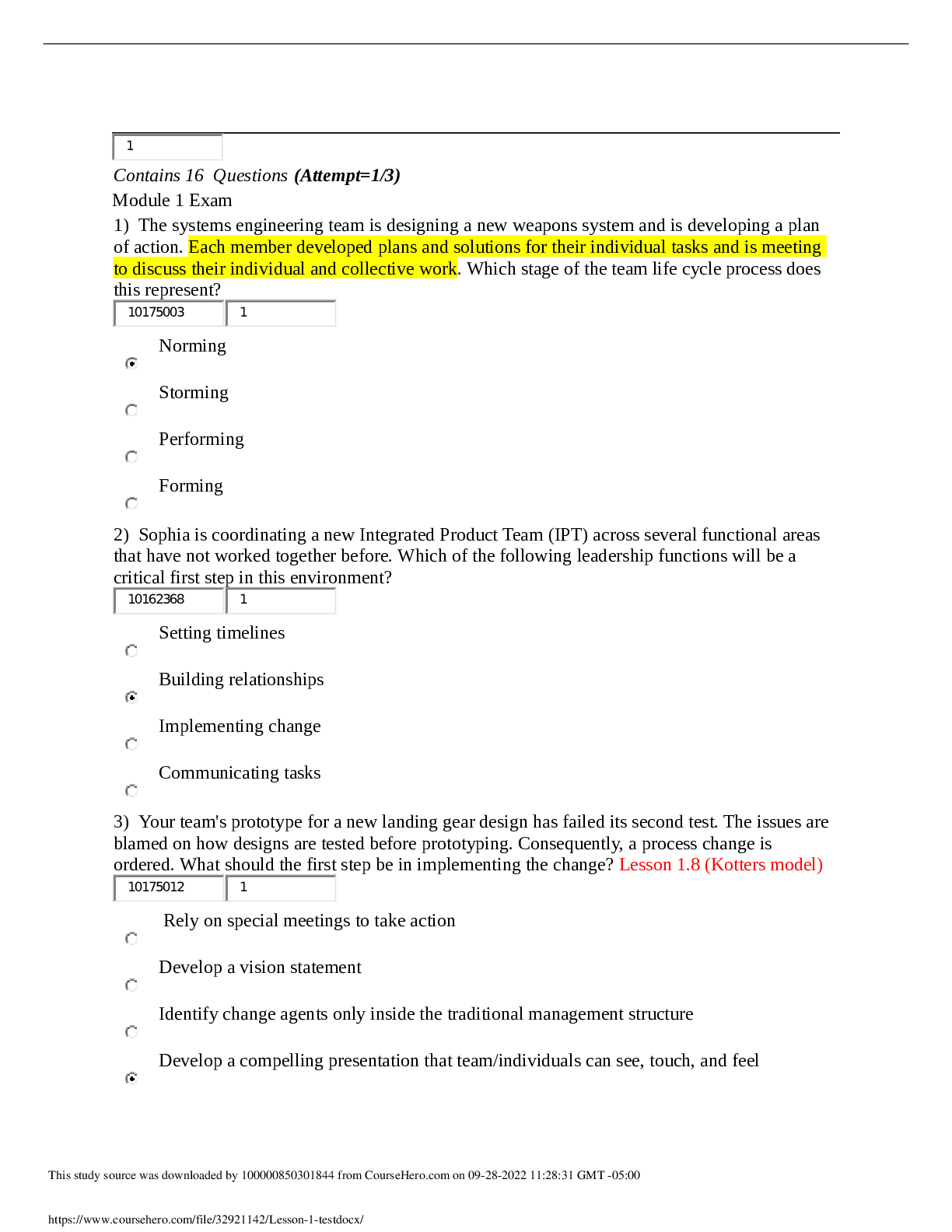


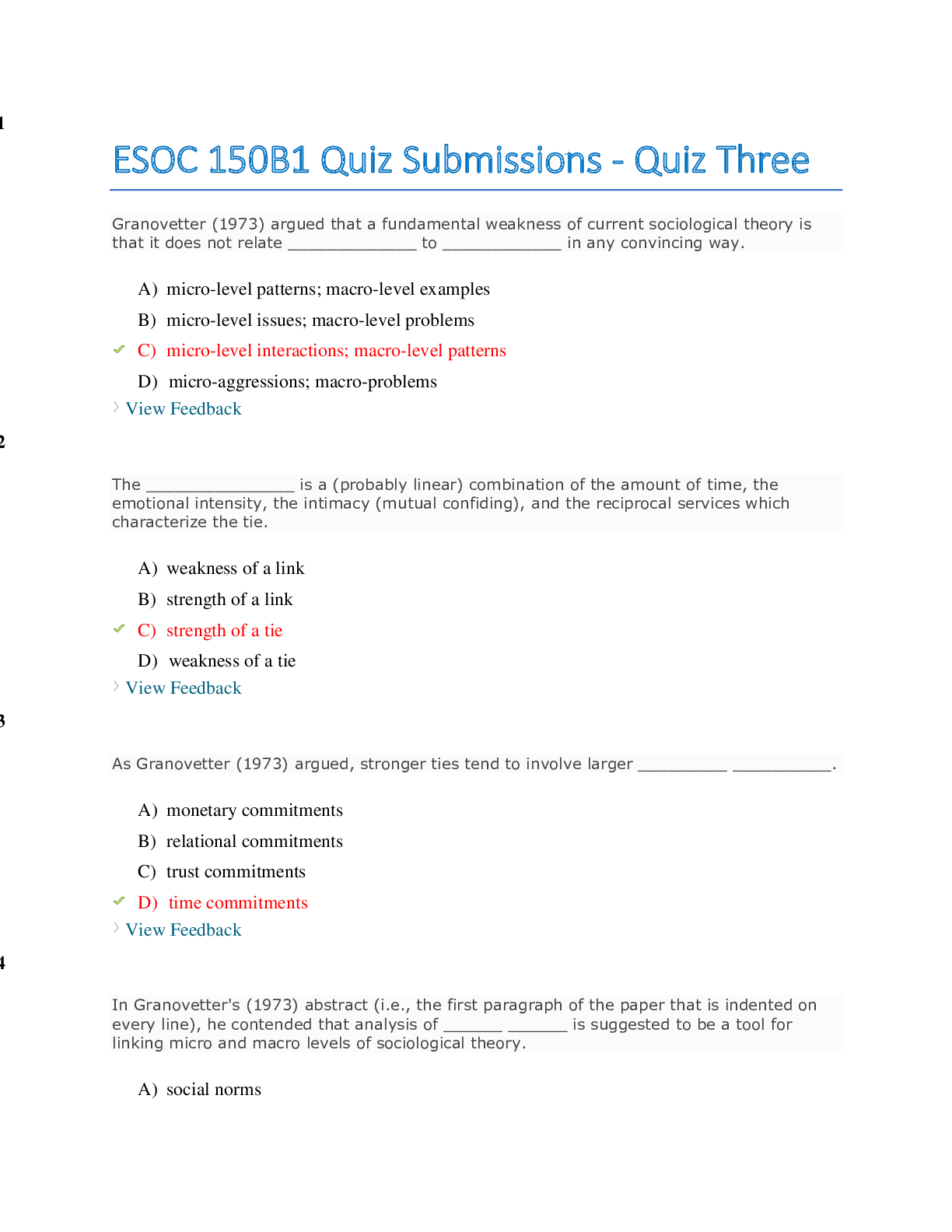
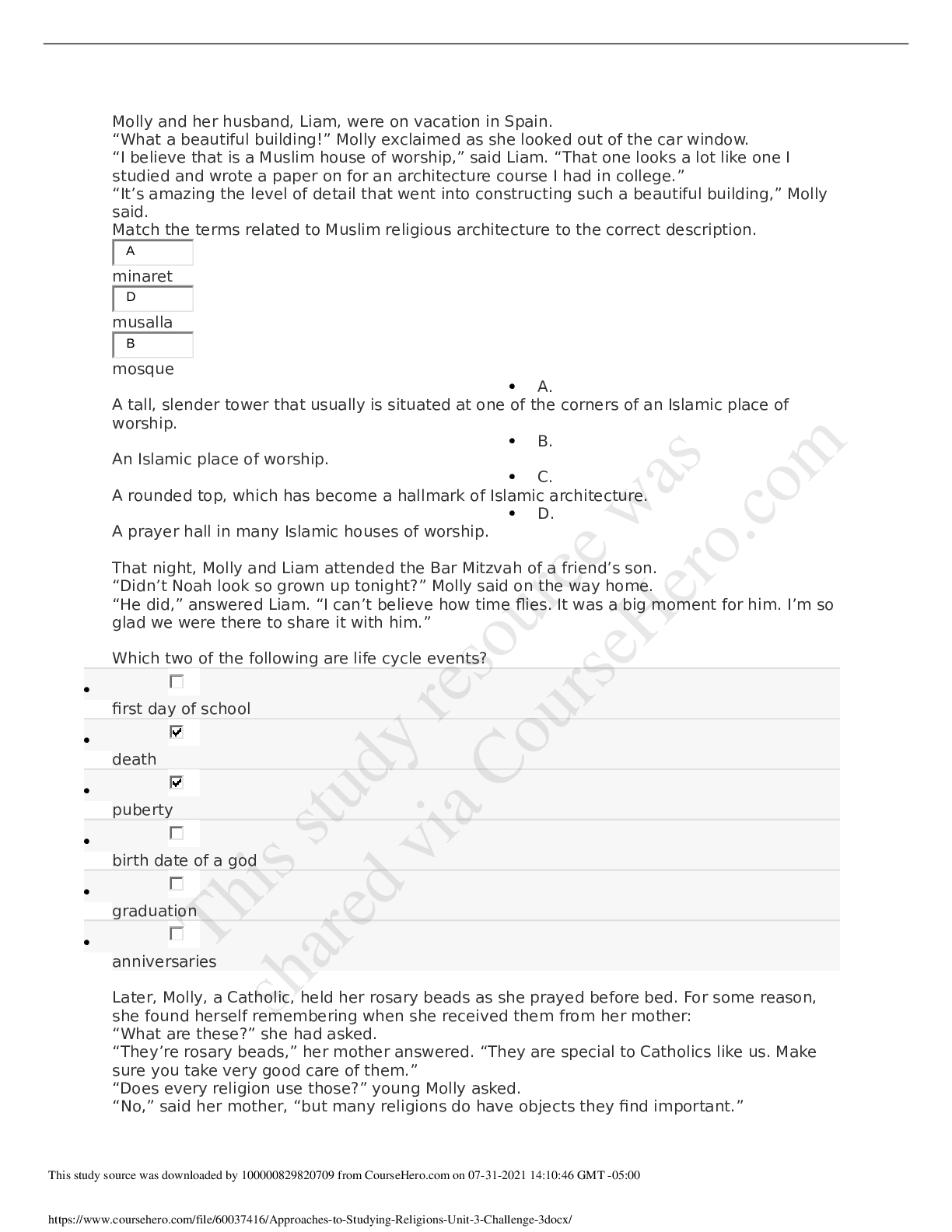
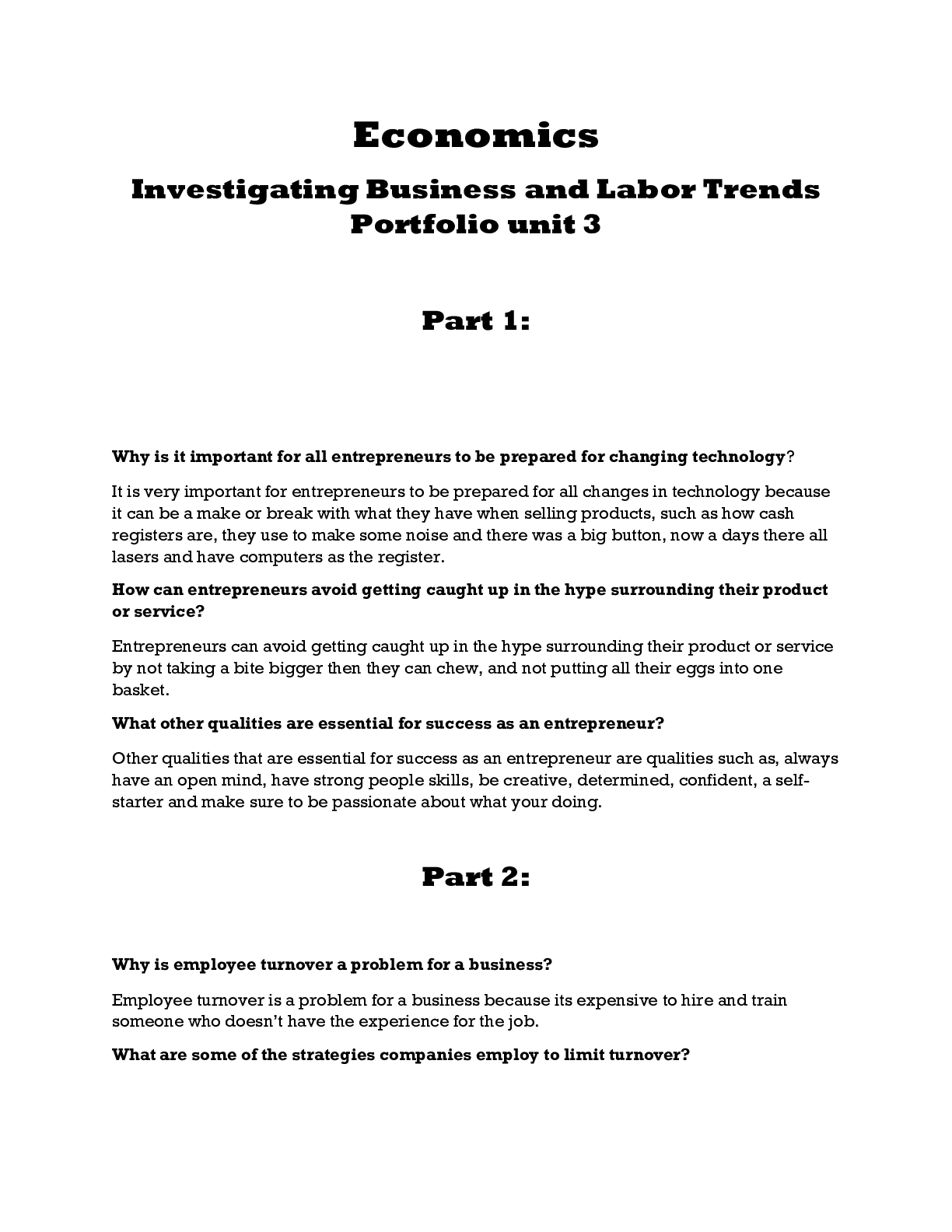
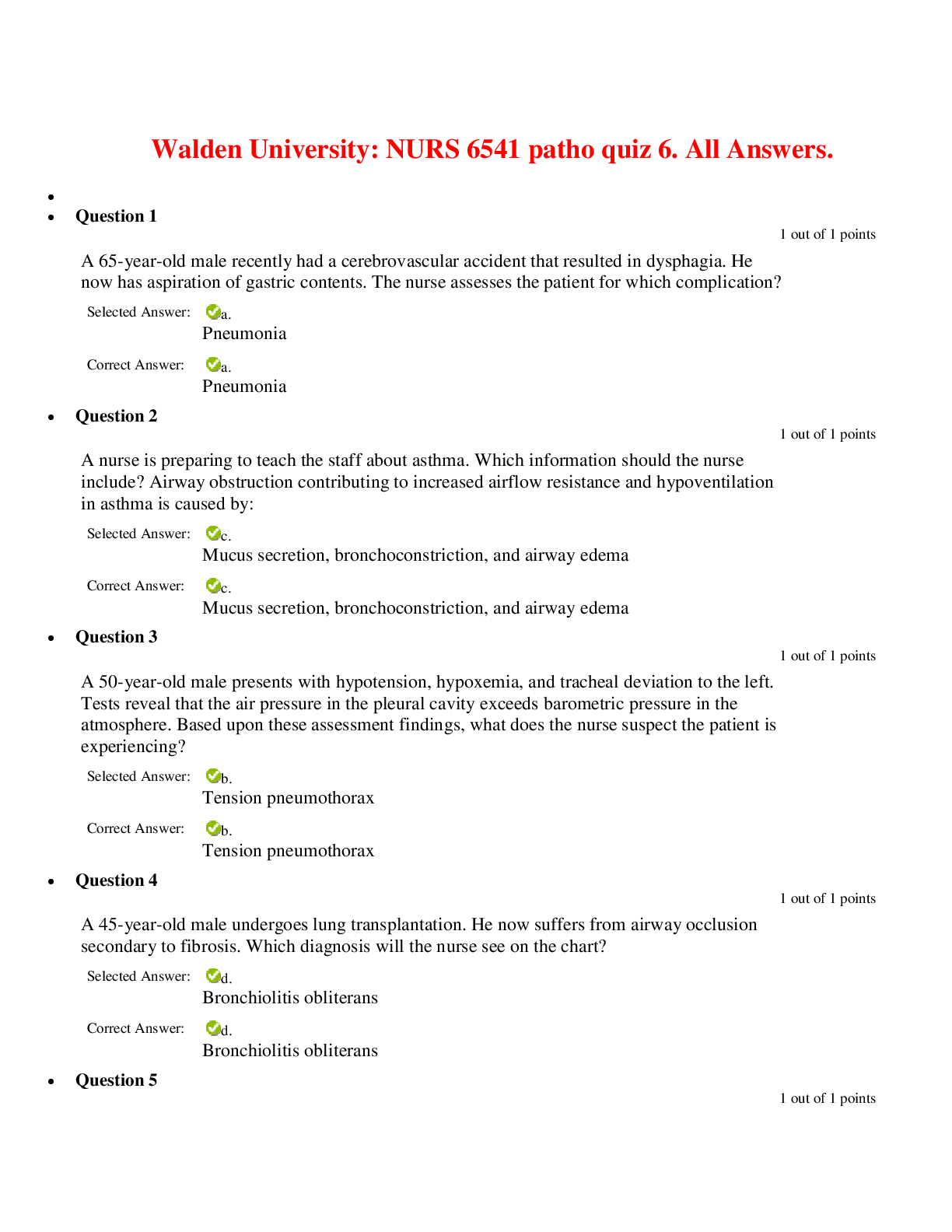
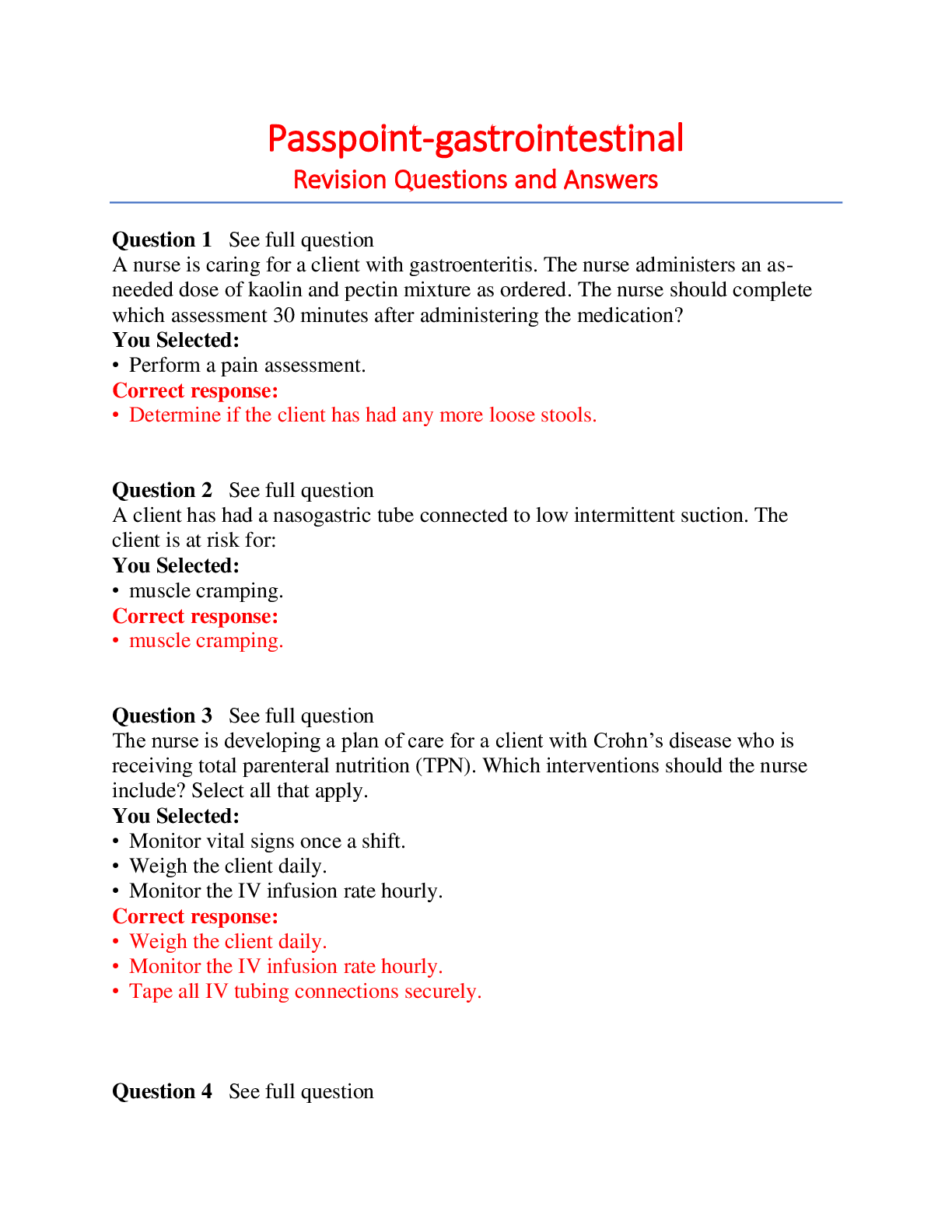
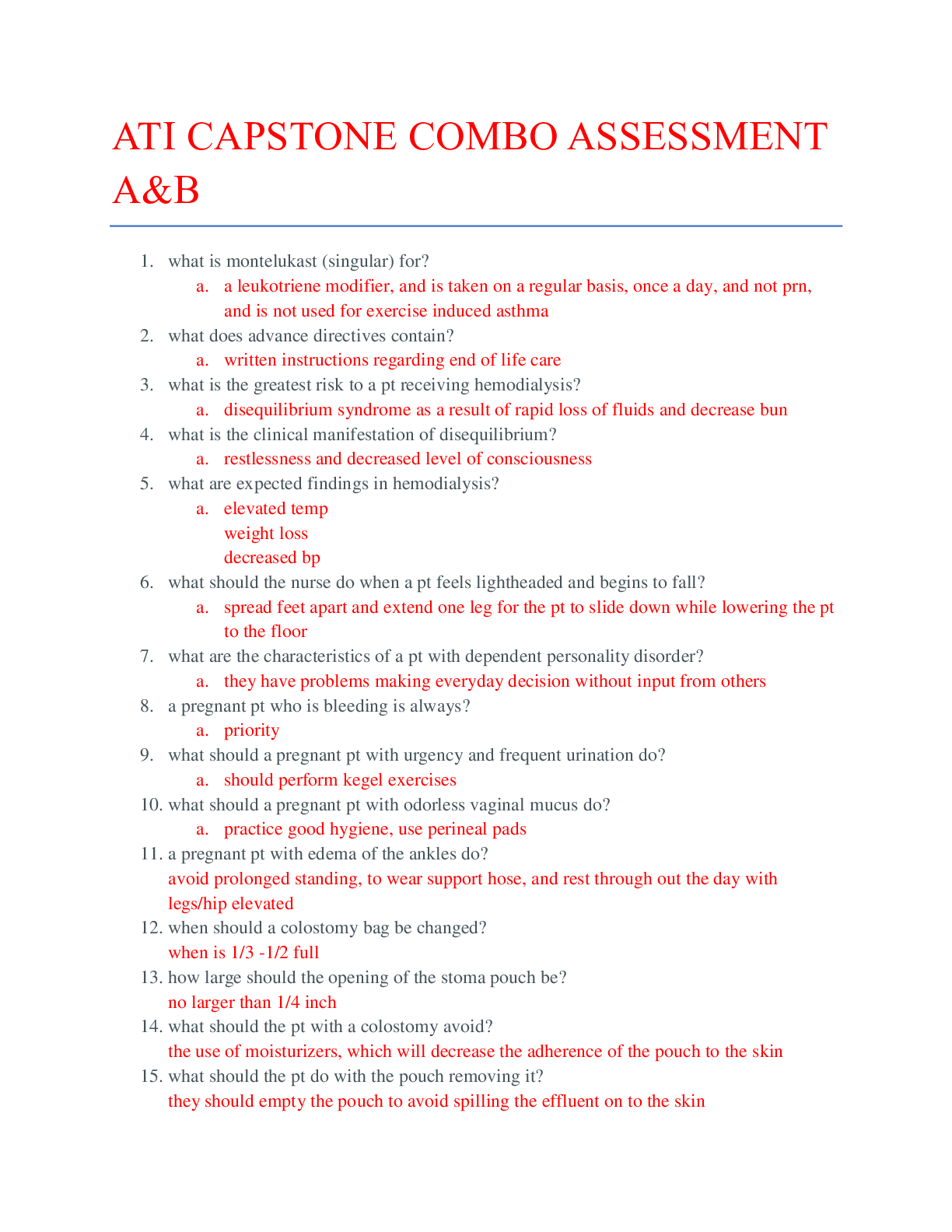
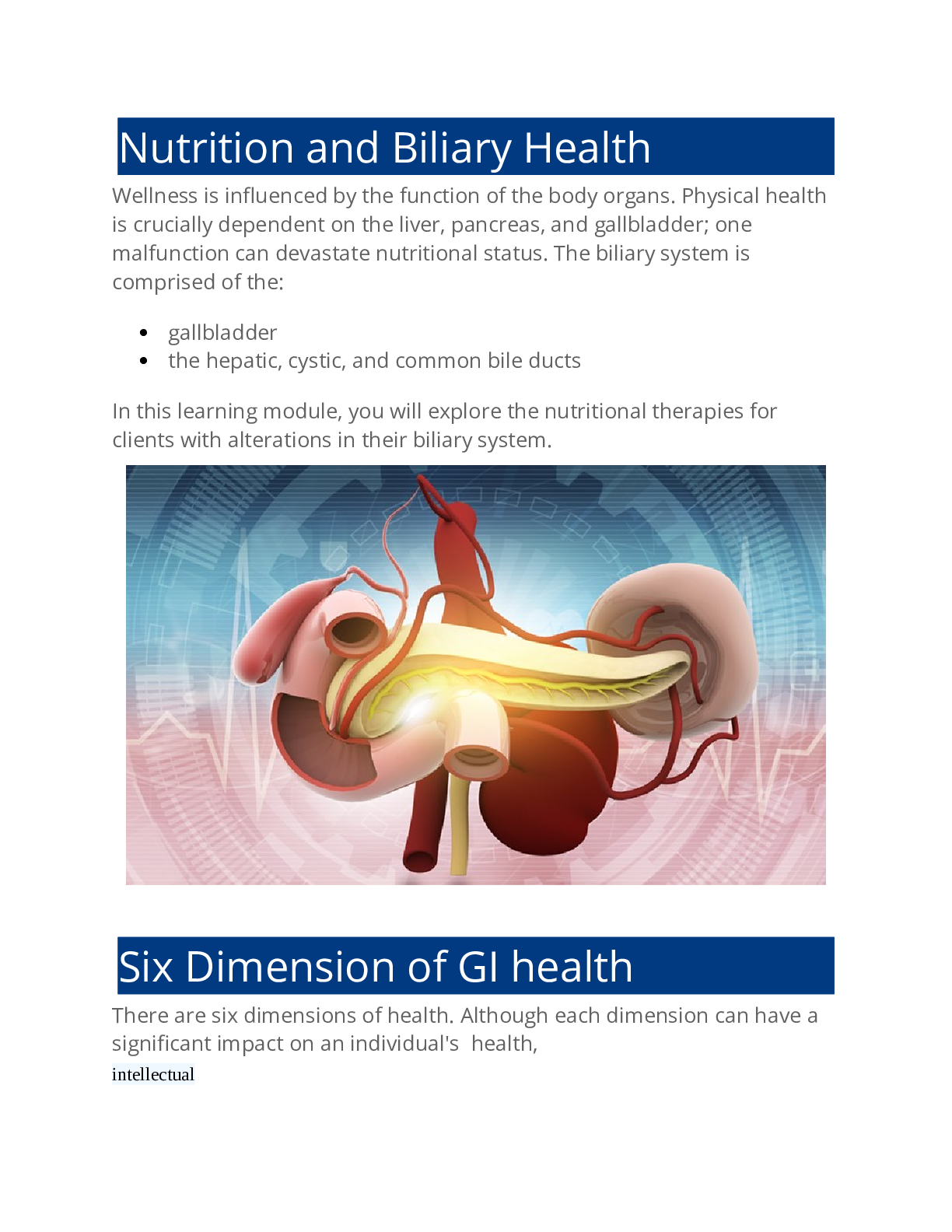
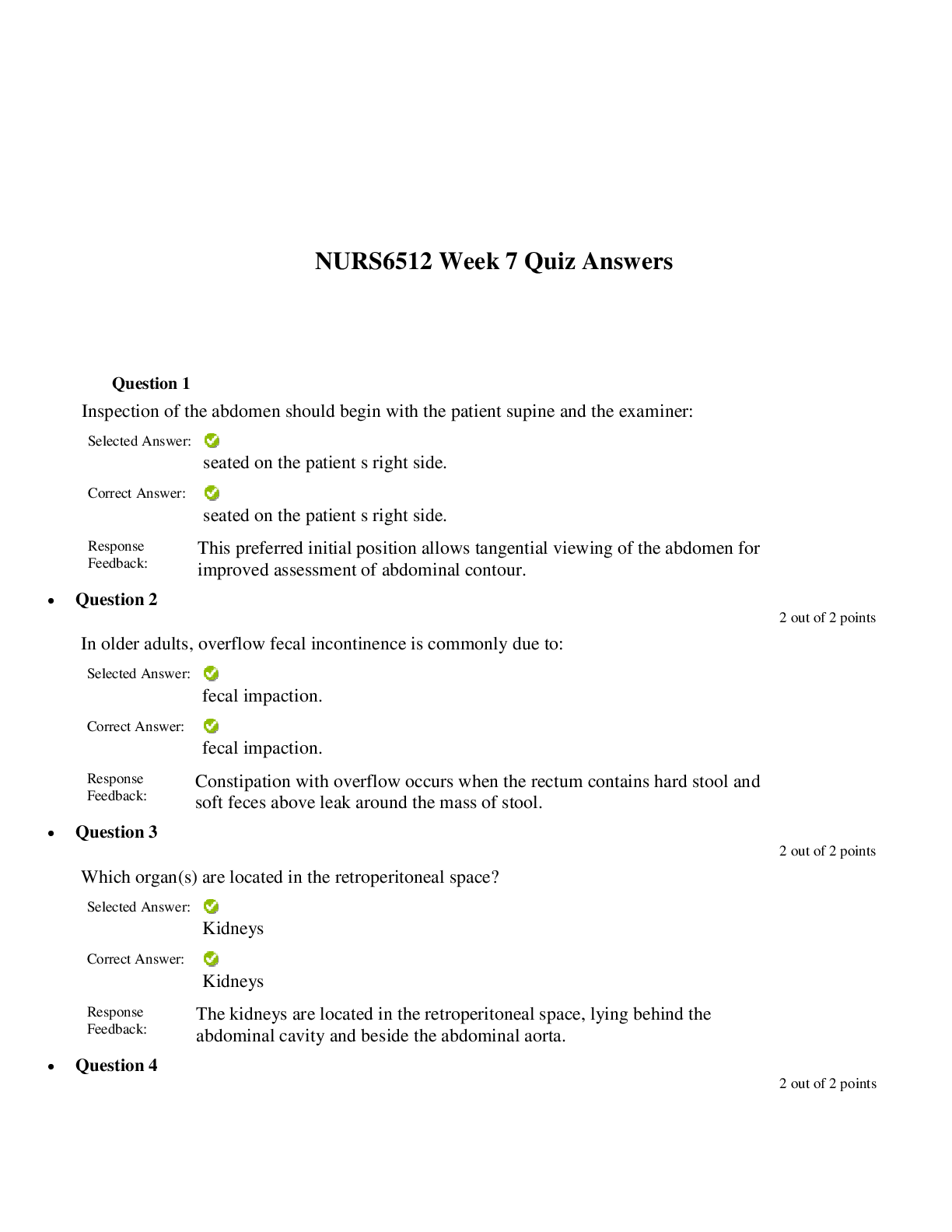
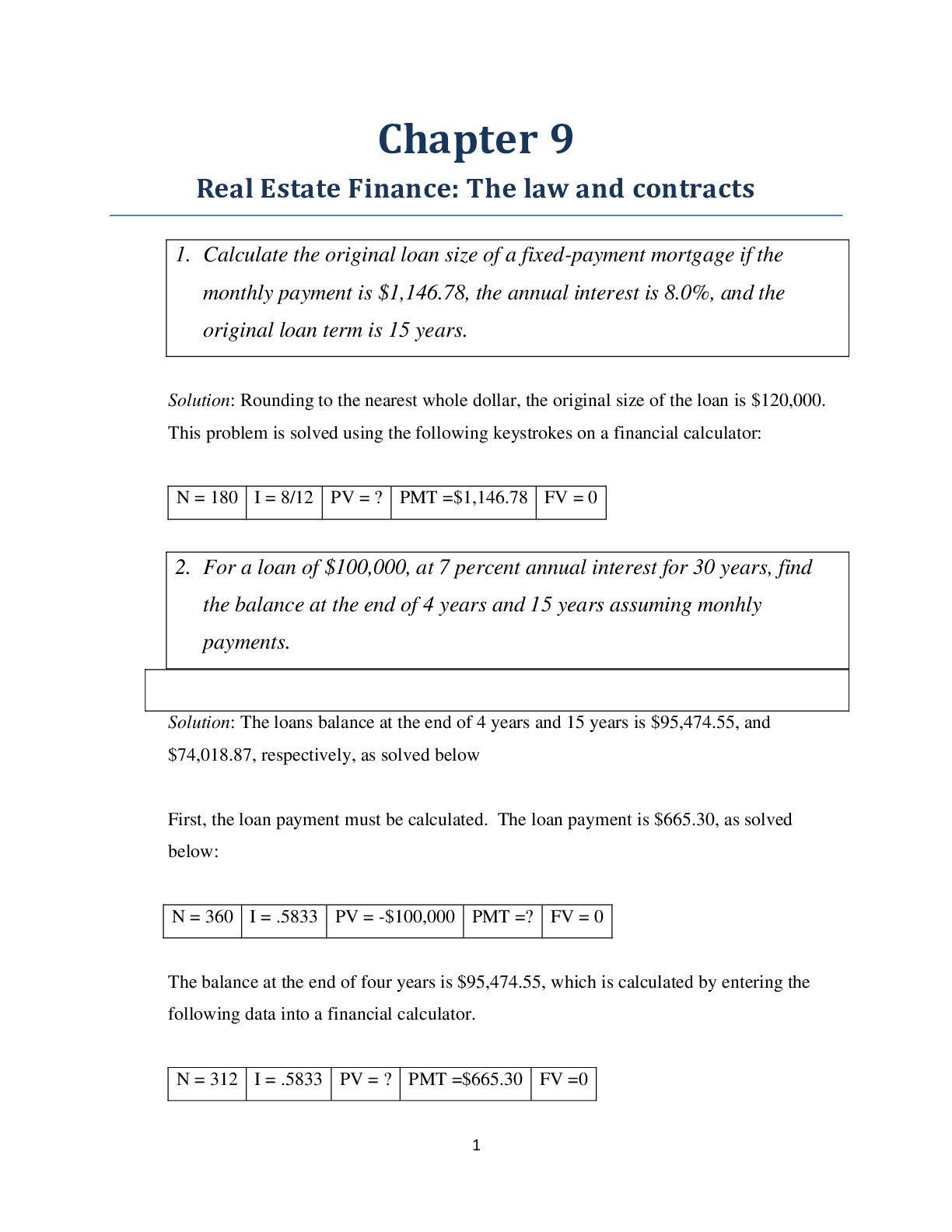
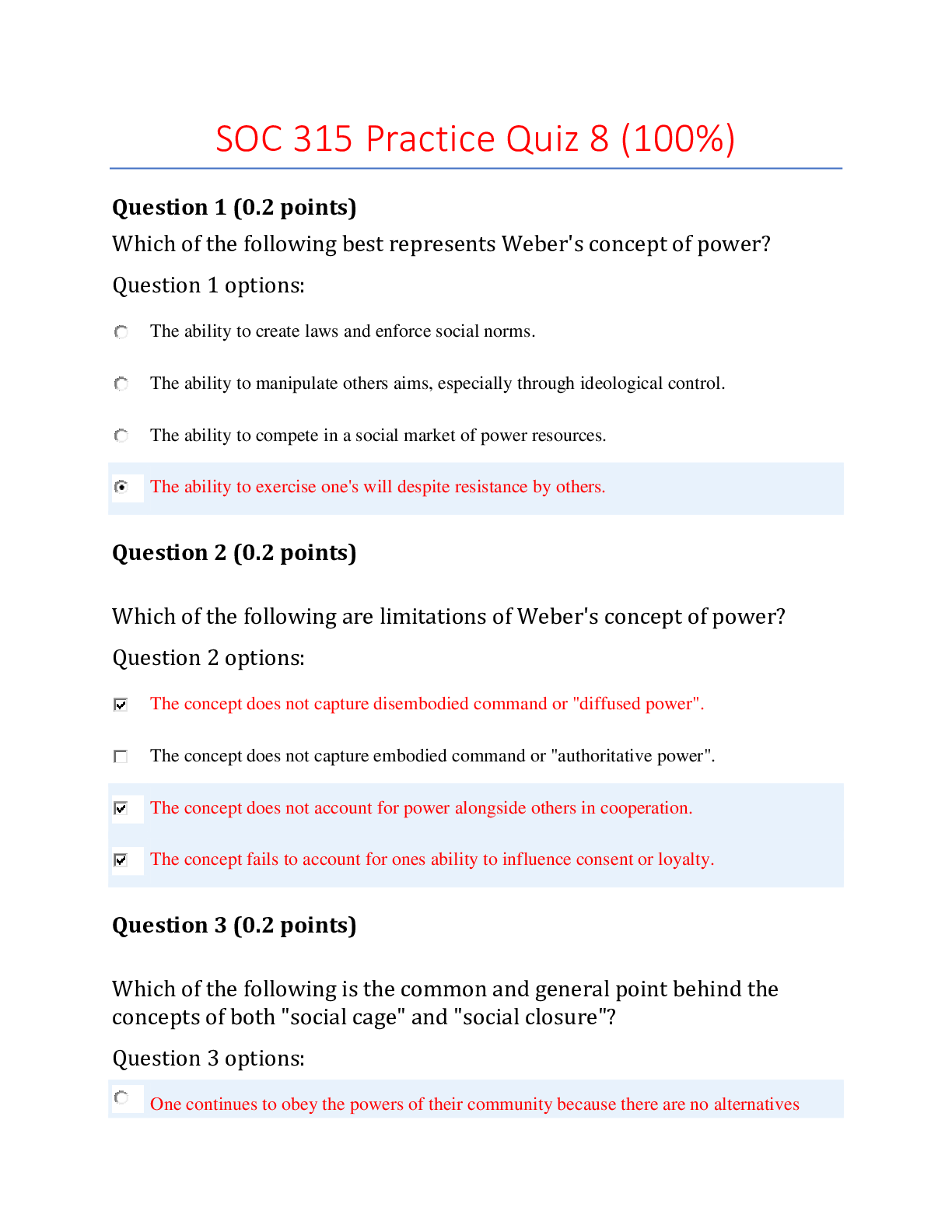

.png)
